Playoff MVPs: Choosing the best player in each postseason in NBA history
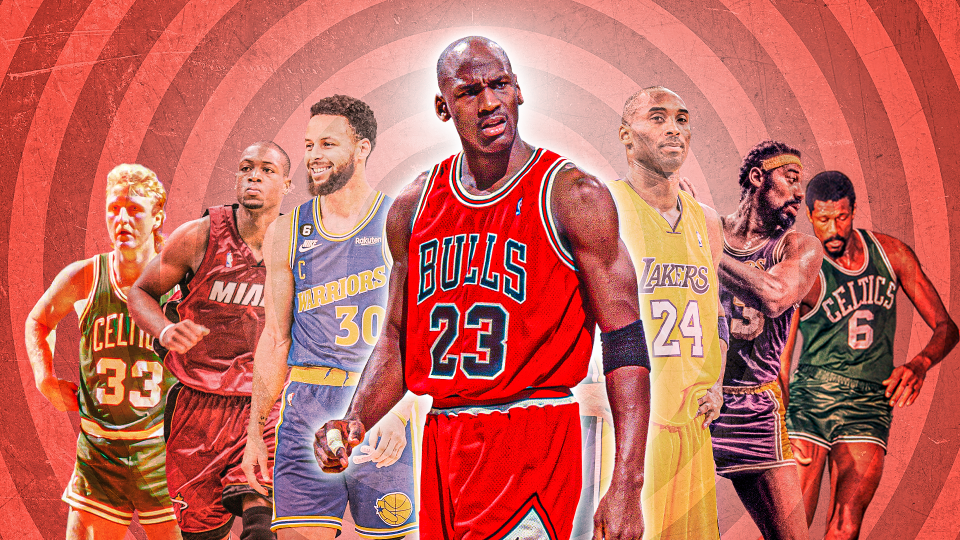
In the NBA, there is a regular season MVP and a Finals MVP, but no award for the best player of the postseason, which is odd if you think about it. Hell, we even had a bubble MVP that one time.
No worries, though, because we are here to right that wrong by naming a Playoff MVP for every postseason dating back all the way to the BAA days. There’s a bit of overlap between Finals MVP and our pick for Playoff MVP but there are also many years in which our Playoff MVP pick didn’t even see his team win the championship.
With so many players to discuss and so many Playoff MVP awards to hand out, let’s get right to it.
(You can go to the bottom of the page to see how many times each legend is selected).
2023: Nikola Jokic (Denver)
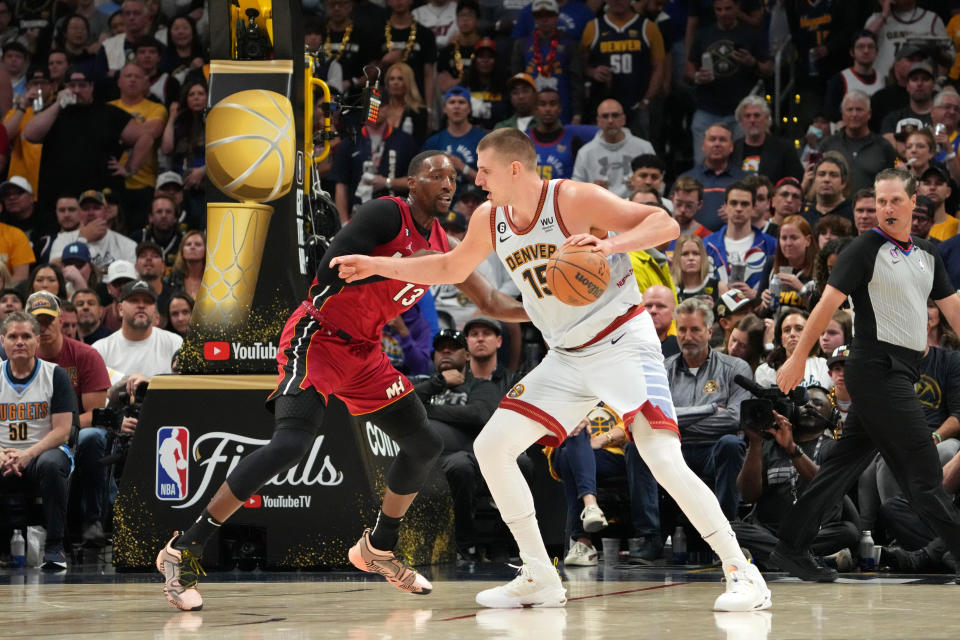
Playoff stats: 30.0 ppg, 13.5 rpg, 9.5 apg and 46.1 3P% in 20 games
Playoff record: 16-4, NBA champion
Nikola Jokic and the Denver Nuggets absolutely trounced every team on their way to the 2023 championship, losing just once in their final 10 games. Jokic was without a doubt the best player all playoffs long, putting up huge numbers on the way to his first championship and first Finals MVP award. People may knock Denver’s opponent’s strength of schedule and call it an easy path to a ring but Jokic and the Nuggets did what great teams do: beat who’s in front of them in convincing fashion. Lest we forget, Jokic went toe-to-toe with Kevin Durant, Devin Booker, Anthony Davis, LeBron James and Jimmy Butler on his way to his first ring and thoroughly outplayed all of them by a substantial margin. Playoffs MVP award No. 1 for Jokic but there very well might be more in his future.
Runner-ups: Jamal Murray, Jimmy Butler
2022: Stephen Curry (Golden State)

Playoff stats: 27.4 ppg, 5.9 apg, 5.2 rpg and 39.7 3P% in 22 games
Playoff record: 16-6, NBA champion
Earning the accolade his legacy was missing, Stephen Curry took home Finals MVP honors thanks to his contributions in the 2022 championship series, a 4-2 victory over the Boston Celtics in which he averaged 31.2 points, 6.0 rebounds and 5.0 assists. Curry’s most impressive performance of that playoff run came in Game 4 of the Finals with Golden State down two games to one. Curry responded that night by going off for 43 points and 10 rebounds on nearly 54 percent shooting from the floor.
Runner-ups: Jimmy Butler, Luka Doncic
2021: Giannis Antetokounmpo (Milwaukee)
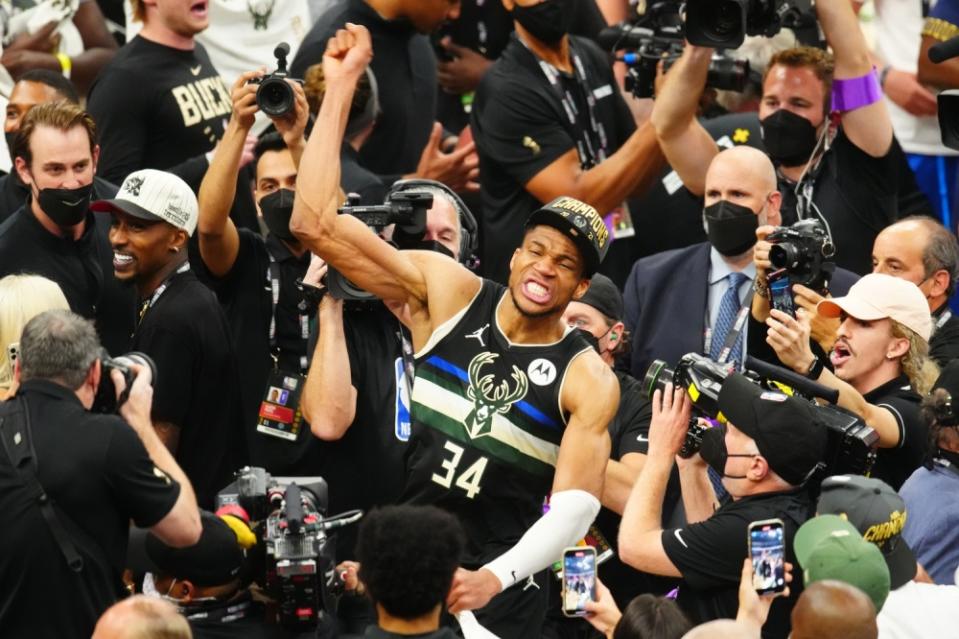
Playoff stats: 30.2 ppg, 12.8 rpg, 5.1 apg and 56.9 FG% in 21 games
Playoff record: 16-7, NBA champion
Many might forget that our Playoff MVP for 2021, Giannis Antetokounmpo, actually suffered a scary knee injury in Game 4 of the Eastern Conference Finals against the Atlanta Hawks, only to come back by Game 1 of the Finals to dominate the Phoenix Suns over a six-game series victory for the Milwaukee Bucks. Antetokounmpo’s most pristine performance of that playoffs actually came in his final outing, Game 6 against Phoenix, when he exploded for 50 points, 14 rebounds and five blocks on his way to winning Finals MVP.
Runner-ups: Chris Paul, Kawhi Leonard
2020: LeBron James (LA Lakers)
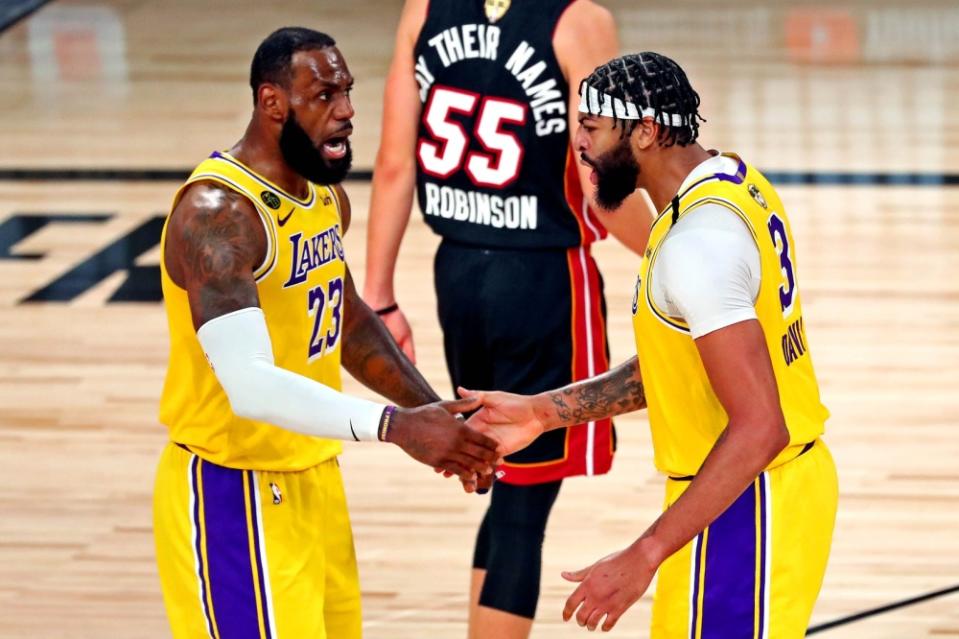
Playoff stats: 27.6 ppg, 9.1 rpg, 8.8 apg and 56.0 FG% in 21 games
Playoff record: 16-5, NBA champion
Playoff MVP honors for 2020 go to the same player who won Finals MVP that year, LeBron James, after a six-game championship victory over his former team, the Miami Heat, in which he averaged 29.8 points, 11.8 rebounds and 8.5 assists. Heat star Jimmy Butler did well to challenge him in that championship showdown but overall, James was the better player for the entirety of that postseason.
Runner-ups: Anthony Davis, Jimmy Butler
2019: Kawhi Leonard (Toronto)
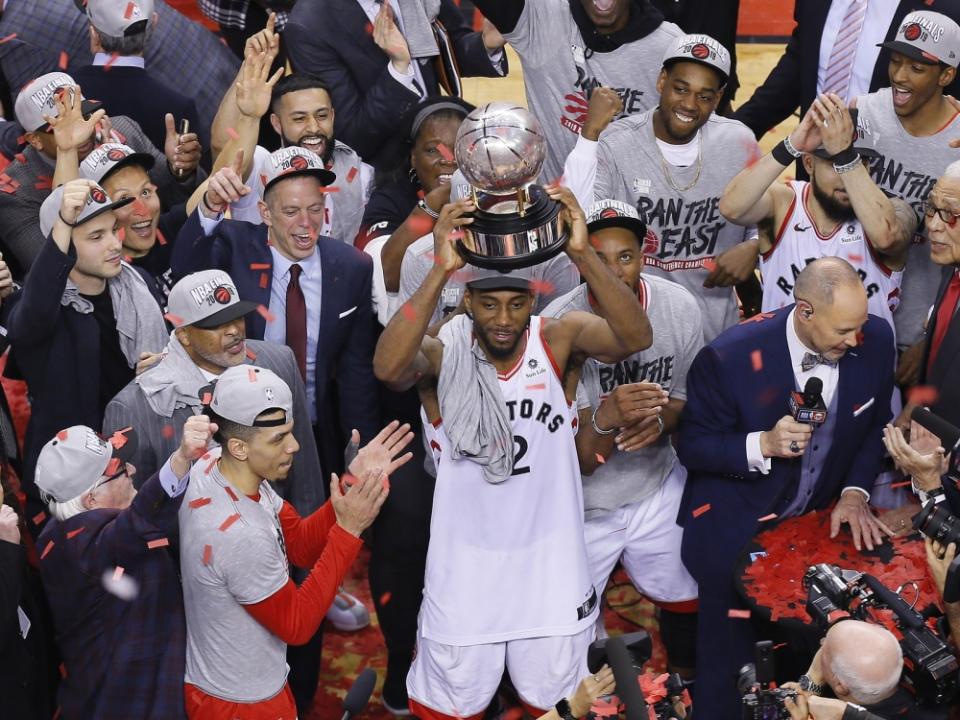
Playoff stats: 30.5 ppg, 9.1 rpg, 1.7 spg and 49.0 FG% in 24 games
Playoff record: 16-8, NBA champion
Truly solidifying himself as an all-time great by winning his second championship and his second Finals MVP – while with his second franchise, no less – Kawhi Leonard wins Playoff MVP for 2019, according to us, as well. Leonard was an absolute monster that entire postseason, helping lead the Toronto Raptors to that championship despite not being the most talent-laden team that year. (Injuries to key Warriors players helped).
Leonard had eight games of 35-plus points, peaking in Game 1 of the second round against the Philadelphia 76ers with a 45-point, 11-rebound performance. Lest we forget, Leonard also had the most memorable moment, with his trickling, series-clinching fadeaway jumper to send the Raptors to the Conference Finals in Game 7 against Philadelphia.
Runner-ups: Stephen Curry, Giannis Antetokounmpo
2018: LeBron James (Cleveland)
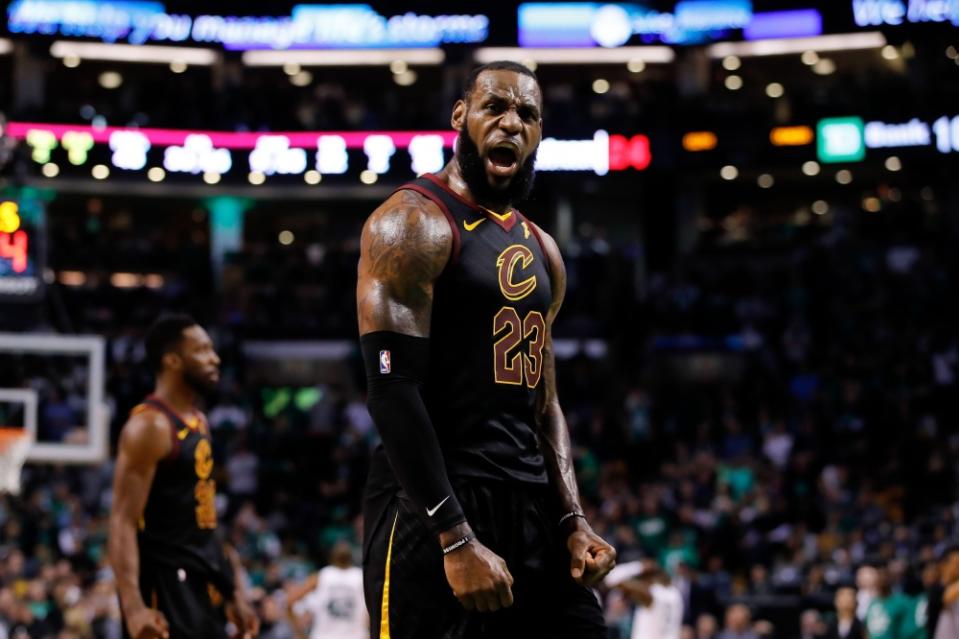
Playoff stats: 34.0 ppg, 9.1 rpg, 9.0 apg and 53.9 FG% in 22 games
Playoff record: 12-10, lost in Finals (0-4 vs. Golden State)
The first instance on this list of a player who didn’t win the championship that year receiving Playoff MVP honors anyway, there’s no doubt James was the best player of the 2018 postseason. He and his Cleveland Cavaliers just ran into one of the most stacked rosters ever in the Finals in the form of the Golden State Warriors. James had eight games of 42-plus points that year, including a 51-point, eight-rebound, eight-assist masterpiece in Game 1 of the Finals against Golden State, a 10-point overtime defeat for Cleveland.
Runner-ups: Kevin Durant, Stephen Curry
2017: LeBron James (Cleveland)

Playoff stats: 32.8 ppg, 9.1 rpg, 7.8 apg and 56.6 FG% in 18 games
Playoff record: 13-5, lost in Finals (1-4 vs. Golden State)
James wasn’t quite as ridiculous in the 2017 postseason as the year after but he was still the Playoff MVP, in our opinion. The four-time league MVP only scored fewer than 30 points four times while also putting up big rebounding and assist totals. Alas, the Warriors were just too loaded, as the Cavaliers fell to Golden State in five games in the 2017 Finals.
Runner-ups: Stephen Curry, Kevin Durant
2016: LeBron James (Cleveland)

Playoff stats: 26.3 ppg, 9.5 rpg, 7.6 apg and 52.5 FG% in 21 games
Playoff record: 16-5, NBA champion
Leading the Cavaliers on a miraculous, incredible comeback in the Finals that year after being down three games to one in the championship series, James was the clear-cut Playoff MVP. After Game 4 of the Finals, James went nuclear, averaging 36.3 points, 11.7 rebounds, 9.7 assists, 3.0 steals and 3.0 blocks on 50-plus percent shooting from the floor to complete the comeback and bring home a championship to Cleveland.
Runner-ups: Kevin Durant, Kyrie Irving
2015: LeBron James (Cleveland)

Playoff stats: 30.1 ppg, 11.3 rpg, 8.5 apg and 41.7 FG% in 20 games
Playoff record: 14-6, lost in Finals (2-4 vs. Golden State)
Is it obvious that this era of the NBA unquestionably belonged to James? Our 2015 Playoff MVP award goes to James yet again and with good reason, as despite losing in the Finals that year, the do-everything forward was really awesome, scoring 35-plus points six times, securing at least 14 rebounds six times and dishing out 11-plus assists six times. Plus, Cleveland might not have lost in the Finals that year had Kevin Love and Kyrie Irving not gone down with injuries. Just to show how unstoppable James was that year, Warriors swingman Andre Iguodala actually won Finals MVP in 2015 for his part in slowing James down. James’ averages in that championship series? 35.8 points, 13.3 rebounds and 8.8 assists. Cleveland’s second-leading scorer against the Warriors was Timofey Mozgov, just to show how little help James had.
Runner-ups: Stephen Curry, James Harden
2014: LeBron James (Miami)
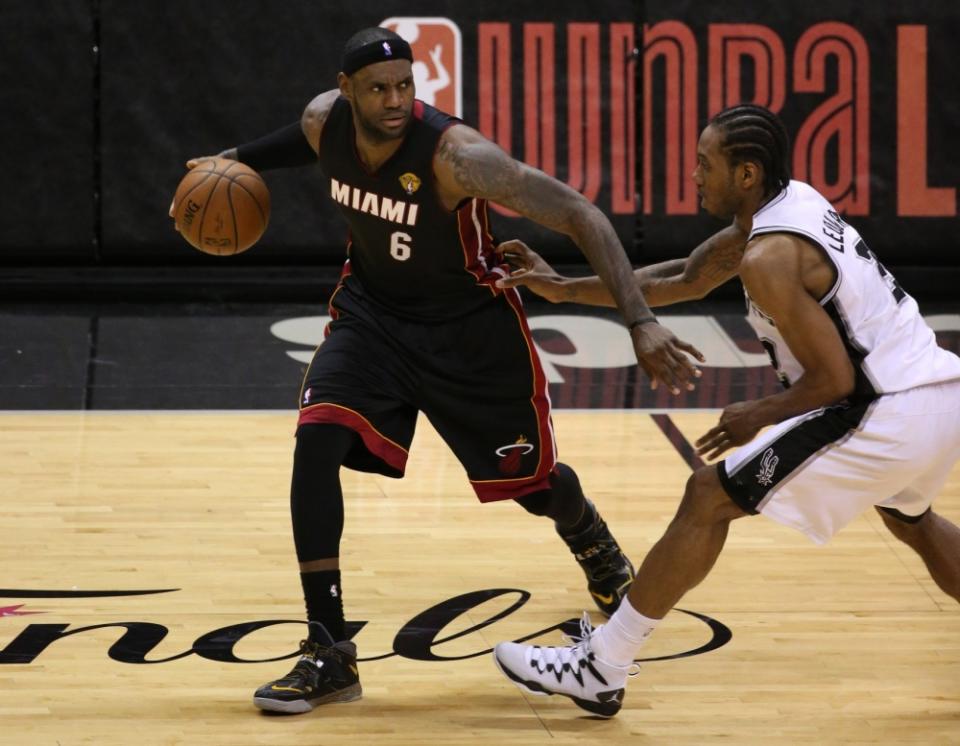
Playoff stats: 27.4 ppg, 7.1 rpg, 4.8 apg and 56.5 FG% in 20 games
Playoff record: 13-7, lost in Finals (1-4 vs. San Antonio)
James’ final playoff run in Miami was another great stretch of games for the potential GOAT, with James peaking in Game 4 of the second round against the Brooklyn Nets, the night he dropped 49 points on 24 shot attempts against an overmatched Paul Pierce and Co.
Runner-ups: Tim Duncan, Kevin Durant
2013: LeBron James (Miami)
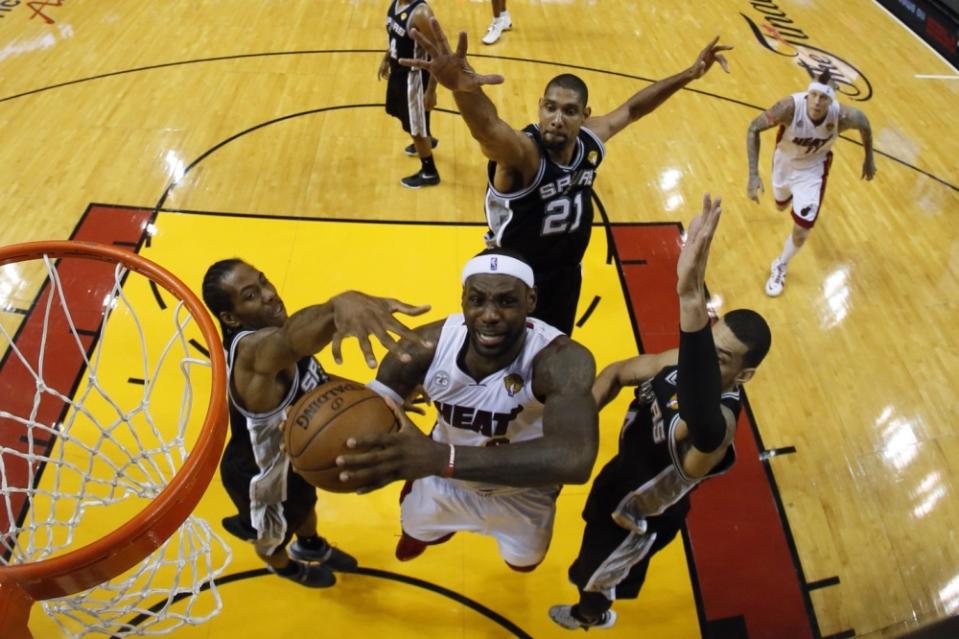
Playoff stats: 25.9 ppg, 8.4 rpg, 6.6 apg and 49.1 FG% in 23 games
Playoff record: 16-7, NBA champion
The second Finals MVP of James’ career came in 2013 after an all-time classic championship series against the San Antonio Spurs, which went seven games and saw James’ Heat down three games to two with the final two games heading to Miami. Over those final two games, James’ game hit another level, as our Playoff MVP that year averaged 34.5 points, 11.0 rebounds, 7.5 assists and 2.5 steals in that stretch to lead Miami to the come-from-behind win. Ray Allen gets a lot of the credit for his historic game-tying corner three in Game 6 to force overtime, but many forget that James hit the dagger jumper in Game 7, over Leonard, no less, to win Miami the title.
Runner-ups: Tony Parker, Tim Duncan
2012: LeBron James (Miami)

Playoff stats: 30.3 ppg, 9.7 rpg, 5.6 apg and 50.0 FG% in 23 games
Playoff record: 16-7, NBA champion
James won the first championship of his career in 2012, took home Finals MVP and now is also dubbed our Playoff MVP for that year. James had 13 games with at least 30 points that postseason, with his best performance coming in Game 6 of the Eastern Conference Finals against the Celtics. That night, with James and the Heat down three games to two and having to hit the road to play in front of a very hostile Boston crowd, James had one of the best games of his career, putting up 45 points and 15 rebounds on 19-of-26 shooting in a 19-point win for the Heat, allowing the series to head back to South Beach, where Miami won Game 7 comfortably.
Runner-ups: Kevin Durant, Rajon Rondo
2011: Dirk Nowitzki (Dallas)
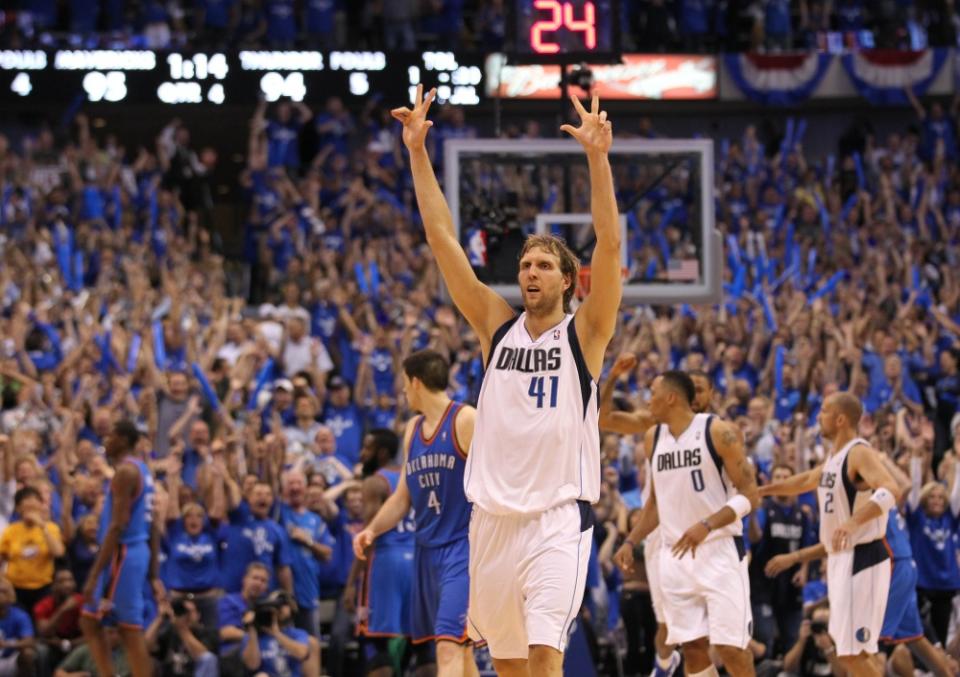
Playoff stats: 27.7 ppg, 8.1 rpg, 2.5 apg and 46.0 3P% in 21 games
Playoff record: 16-5, NBA champion
Heading into the 2011 Finals, James was by far the best player in the playoffs but he followed that up by laying a major egg against Dirk Nowitzki and the Dallas Mavericks in the championship series, unable to score on the likes of Brian Cardinal, Jason Kidd and JJ Barea, costing Miami the championship that year when Dwyane Wade still hadn’t been run down by injuries and Chris Bosh was already a championship-level third option. Still, Nowitzki deserves a ton of credit for that historic playoff run, cementing himself even further as an all-time great thanks to his postseason play that year.
Runner-ups: LeBron James, Dwyane Wade
2010: Kobe Bryant (LA Lakers)
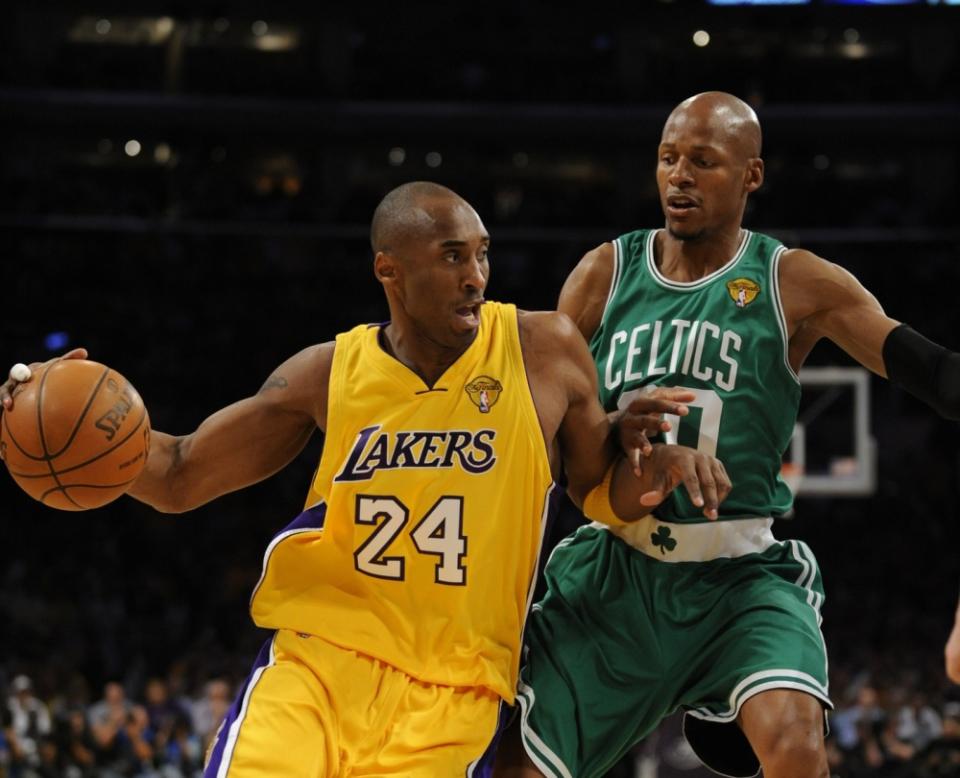
Playoff stats: 29.2 ppg, 6.0 rpg, 5.5 apg and 45.8 FG% in 23 games
Playoff record: 16-7, NBA champion
A classic showdown in the 2010 Finals between the Lakers and Celtics saw Los Angeles come out on top in seven games, thanks in large part to the play of Kobe Bryant, who was so good in the championship series that he was still the clear-cut Finals MVP despite going 6-for-24 in the deciding Game 7. Bryant had 14 30-plus-point games in that playoff run, peaking in Game 1 of the Western Conference Finals against the Phoenix Suns with a 40-point performance.
Runner-ups: Pau Gasol, Paul Pierce
2009: LeBron James (Cleveland)

Playoff stats: 35.3 ppg, 9.1 rpg, 7.3 apg and 51.0 FG% in 14 games
Playoff record: 10-4, lost in Eastern Conference Finals (2-4 vs. Orlando)
If you thought you were done reading about James’ Playoff MVPs, you would be mistaken, as our 2009 Playoff MVP also goes to James despite the fact he didn’t even make it to the Finals that year. That failure is hard to pin on James in hindsight, as he really did all he could in the Eastern Conference Final defeat against Dwight Howard and the Orlando Magic, dropping 49 points in Game 1, 41 points in Game 3 and 44 points in Game 4 before going down in six contests. Howard did make this a close call, though, as he put up 20.3 points, 15.3 rebounds and 2.6 blocks over 23 postseason games that year.
Runner-ups: Kobe Bryant, Dwight Howard
2008: Kobe Bryant (LA Lakers)
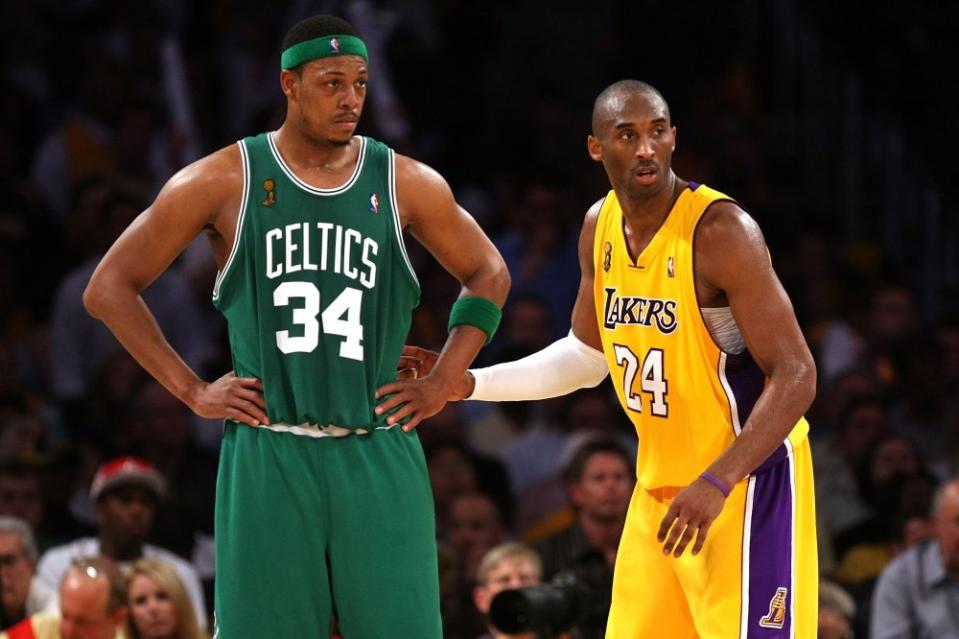
Playoff stats: 30.1 ppg, 5.7 rpg, 5.6 apg and 47.9 FG% in 21 games
Playoff record: 14-7, lost in Finals (2-4 vs. Boston)
Another Playoff MVP award for the legendary Bryant, in a year where he didn’t even win a championship, no less. It’s hard to argue that Bryant wasn’t the best player that postseason, though, as he put up a 30/5/5 stat line and led his Lakers to the Finals where they ran into a peak Celtics Big Three of Kevin Garnett, Paul Pierce and Ray Allen, who had a great supporting cast around them, to boot.
Runner-ups: Kevin Garnett, Paul Pierce
2007: Tim Duncan (San Antonio)
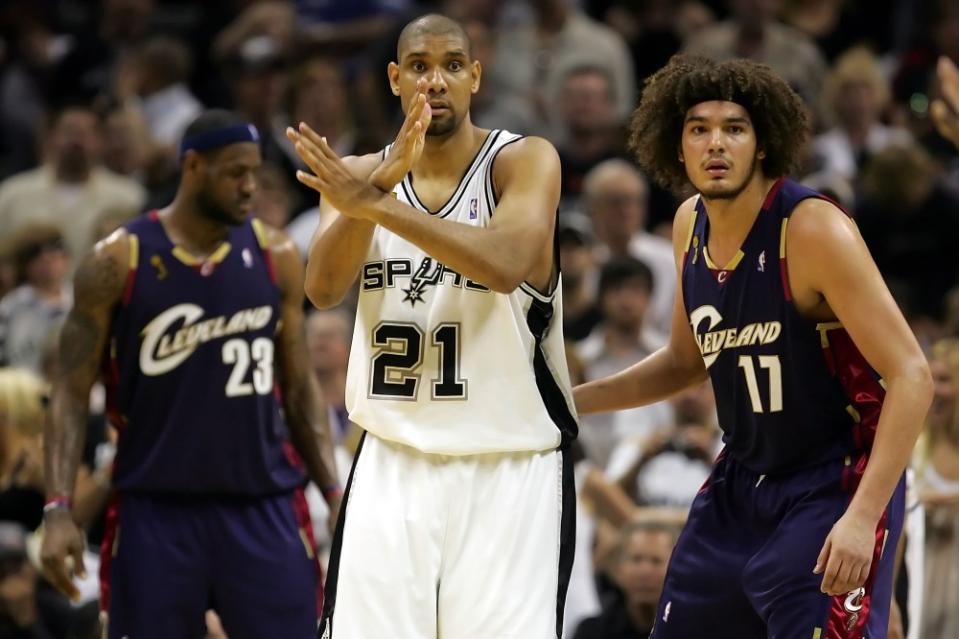
Playoff stats: 22.2 ppg, 11.5 rpg, 3.1 bpg and 52.1 FG% in 20 games
Playoff record: 16-4, NBA champion
The Big Fundamental may not have been the most exciting player to watch but there’s no doubt Tim Duncan was the best power forward of his era and one of the greatest players ever. 2007 was still peak Duncan, as the big man dominated in that playoff run, particularly in Game 6 of the second round against the Suns when he went off for 24 points, 13 rebounds and nine blocks to seal the series victory for the Spurs.
Runner-ups: LeBron James, Chauncey Billups
2006: Dwyane Wade (Miami)

Playoff stats: 28.4 ppg, 5.9 rpg, 5.7 apg and 49.7 FG% in 23 games
Playoff record: 16-7, NBA champion
There was a brief time in the mid-2000s when Dwyane Wade looked like he was making a run to be the best player in the league, and he arguably might have been, at least during the 2006 postseason when – in just his third season – Wade put up 34.7 points, 7.8 rebounds, 3.8 assists and 2.7 steals over a thrilling six-game Finals win over Nowitzki and the Mavericks. His reckless style of play eventually did him in, at least as an elite player, but in 2006, it’s what helped Wade win the first championship of his career.
Runner-ups: Dirk Nowitzki, LeBron James
2005: Dwyane Wade (Miami)

Playoff stats: 27.4 ppg, 5.7 rpg, 6.6 apg and 48.4 FG% in 23 games
Playoff record: 11-4, lost in Eastern Conference Finals (3-4 vs. Detroit)
What many forget is that Wade was just as good the postseason prior, if not better, before a rib injury in Game 4 of the Eastern Conference Finals cost Wade one game and had him far from peak form when he did return for Game 7. The Heat were up three games to two over the Detroit Pistons prior to that Wade injury, too, which stings for Miami fans, who watched their hobbled team fall in seven. Watching Year-2 Wade with a more-spry Shaquille O’Neal in the 2005 Finals against Duncan and the Spurs could have been a whole lot of fun. Prior to Game 4 of the Conference Finals, Wade was averaging 29.1 points, 6.3 rebounds and 7.3 assists, better numbers than his more-often discussed 2006 playoff run.
Runner-ups: Chauncey Billups, Tim Duncan
2004: Kevin Garnett (Minnesota)
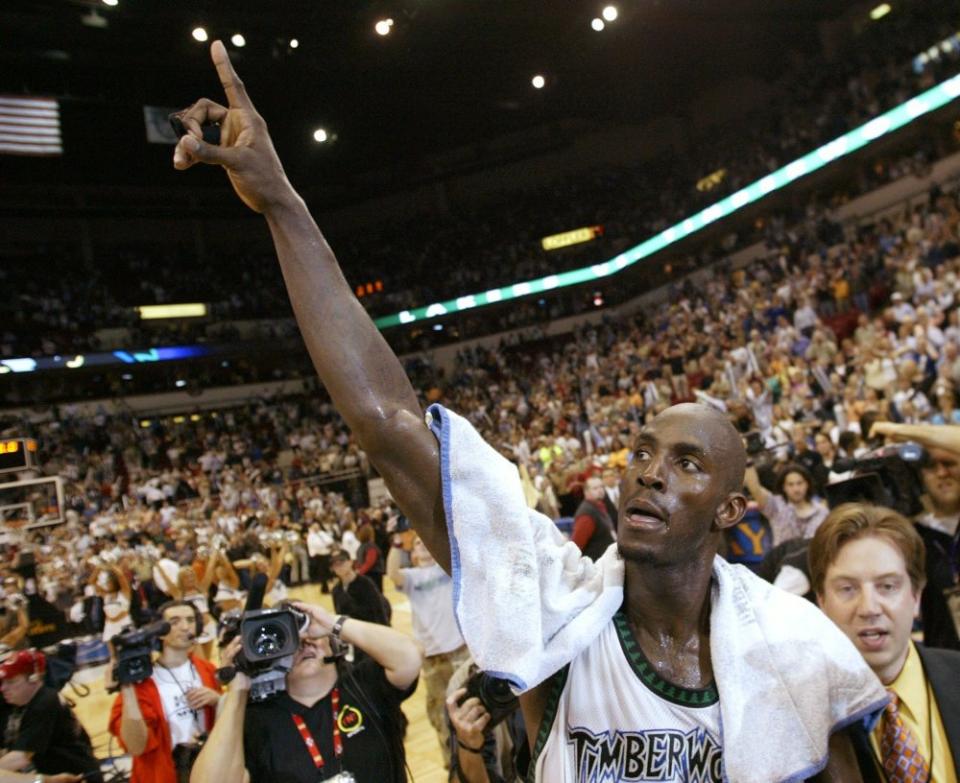
Playoff stats: 24.3 ppg, 14.6 rpg, 2.3 bpg and 45.2 FG% in 18 games
Playoff record: 10-8, lost in Western Conference Finals (2-4 vs. LA Lakers)
Despite not reaching the Finals that year, Garnett is still our 2004 Playoff MVP and looking back, it’s easy to see why. Garnett dragged a good but not great Minnesota Timberwolves roster to Game 6 of the Western Conference Finals against the mighy Lakers, a team with four Hall-of-Famers on it. Some of Garnett’s stats from that playoff run were truly astounding, especially his Game 7 performance against the Sacramento Kings in round two. That night, Garnett exploded for 32 points, 21 rebounds, four steals and five blocks. The Timberwolves won by three that night, by the way.
Runner-ups: Shaquille O’Neal, Kobe Bryant
2003: Tim Duncan (San Antonio)
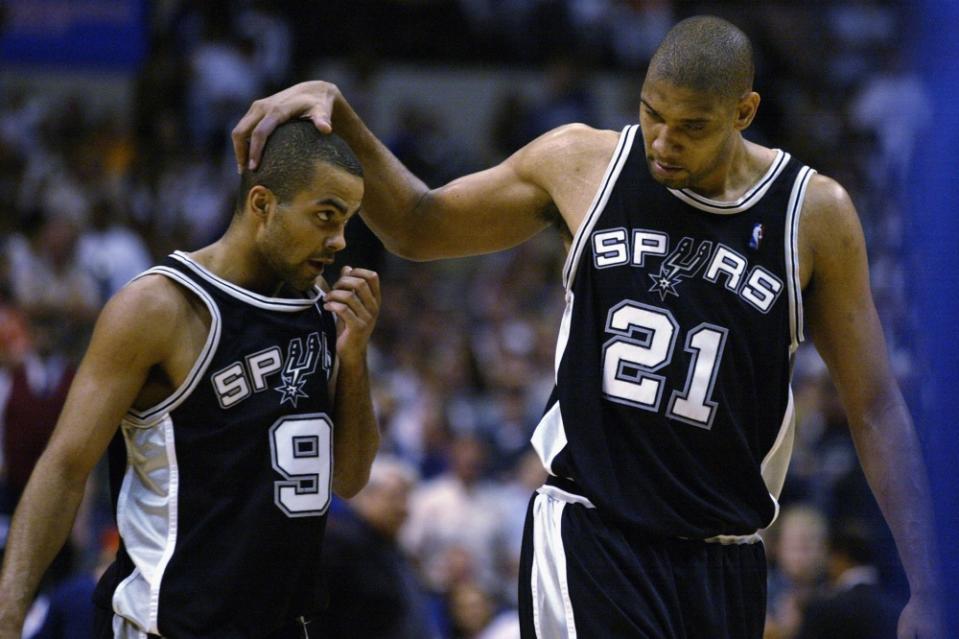
Playoff stats: 24.7 ppg, 15.4 rpg, 3.3 bpg and 52.9 FG% in 24 games
Playoff record: 16-8, NBA champion
The 2007 Playoff MVP was more tail-end-peak-Duncan. The 2003 one, however, was the Hall-of-Famer at his athletic best. Duncan had 14 games that postseason with at least 15 rebounds, including six with 20-plus. That’s to go with six games of at least five blocked shots and six with 30-or-more points. The West was an absolute buzzsaw back then, too, with Duncan having to go through Amare Stoudemire and the Suns in round one, Bryant, O’Neal and the Lakers in round two and Nowitzki and the Mavericks in the Conference Finals. For Duncan to put up those numbers against that level of competition is downright ridiculous.
Runner-ups: Jason Kidd, Dirk Nowitzki
2002: Shaquille O'Neal (LA Lakers)
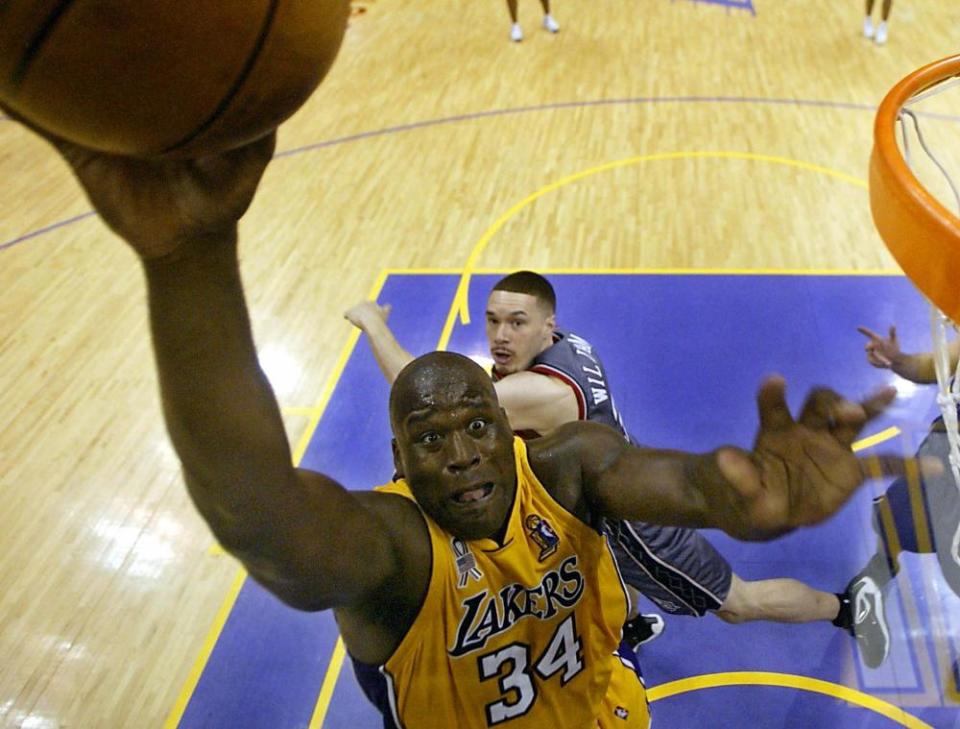
Playoff stats: 28.5 ppg, 12.6 rpg, 2.5 bpg and 52.9 FG% in 19 games
Playoff record: 15-4, NBA champion
One of the most unstoppable forces in league history, O’Neal is our 2022 Playoff MVP for a postseason in which he won Finals MVP after averaging 36.3 points, 12.3 rebounds and 2.8 blocks on 59.5 percent shooting over a four-game sweep of the then-New Jersey Nets. Even more impressive was the way O’Neal stepped up in the Western Conference Finals against the Sacramento Kings, who were maybe the best team in the league that year. Down three games to two, O’Neal exploded in Game 6 to the tune of 41 points, 17 rebounds and two blocks on 14-of-25 shooting. He followed that up with 35 points, 13 rebounds and four blocks in Game 7 – on the road, no less.
Runner-ups: Kobe Bryant, Jason Kidd
2001: Shaquille O'Neal (LA Lakers)

Playoff stats: 30.4 ppg, 15.4 rpg, 2.4 bpg and 55.5 FG% in 16 games
Playoff record: 15-1, NBA champion
2001 saw O’Neal win Finals MVP yet again, another campaign in which we have dubbed him Playoff MVP, as well. O’Neal made light work of facing reigning four-time Defensive Player of the Year Dikembe Mutombo in the Finals that year, putting up 33.0 points, 15.8 rebounds and 3.4 blocks on 57.3 percent shooting over the five-game championship series. O’Neal had three 43-plus-point performances over that playoff run and seven games with at least 30 points.
Runner-ups: Kobe Bryant, Allen Iverson
2000: Shaquille O'Neal (LA Lakers)

Playoff stats: 30.7 ppg, 15.4 rpg, 2.4 bpg and 56.6 FG% in 23 games
Playoff record: 15-8, NBA champion
2000 might have been the best version of O’Neal we ever saw, with the all-time big man putting up some truly outrageous numbers over that playoff run. In just the Finals that year, O’Neal averaged 38.0 points, 16.7 rebounds and 2.7 blocks on 61.1 percent shooting over 4-2 series victory against the Indiana Pacers. O’Neal had five games with at least 40 points in the playoffs that season and 13 with at least 30.
Runner-ups: Reggie Miller, Kobe Bryant
1999: Tim Duncan (San Antonio)
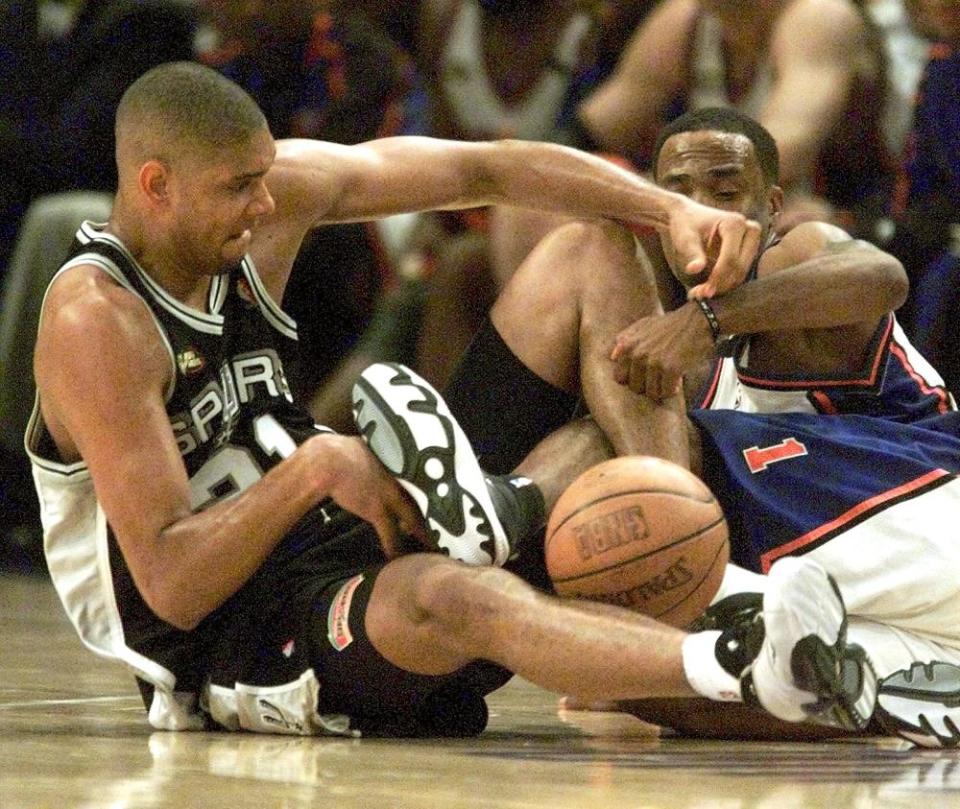
Playoff stats: 23.2 ppg, 11.5 rpg, 2.6 bpg and 51.1 FG% in 17 games
Playoff record: 15-2, NBA champion
It only took until his second season for Duncan to win his first NBA championship. What made Duncan’s playoff run that year even more astounding besides his age and his production is the level of competition he faced, including getting past O’Neal, Bryant and the Lakers in round two. Over the last two games of that series, Duncan was truly unstoppable, putting up 35.0 points, 14.0 rebounds and 4.0 assists to complete the impressive sweep over Los Angeles.
Runner-ups: David Robinson, Shaquille O’Neal
1998: Michael Jordan (Chicago)

Playoff stats: 32.4 ppg, 5.1 rpg, 3.5 apg and 46.2 FG% in 21 games
Playoff record: 15-6, NBA champion
In his final season with the Chicago Bulls and in his age-35 campaign, Jordan went out with what looked like a storybook ending, winning the sixth championship of his career, being named Finals MVP for the sixth time and even hitting the game-winning shot in Game 6 to seal the championship for Chicago. Those were just two of his 45 points that evening, Jordan’s second 40-plus-point performance of the postseason.
The Bulls as a team scored 87 points that night, by the way, meaning Jordan attributed for roughly 52 percent of the team’s scoring.
Runner-ups: Karl Malone, Shaquille O’Neal
1997: Michael Jordan (Chicago)

Playoff stats: 31.1 ppg, 7.9 rpg, 4.8 apg and 45.6 FG% in 19 games
Playoff record: 15-4, NBA champion
Jordan’s 1997 playoff run featured one of his six career 50-plus-point postseason explosions. In this instance, it happened in Game 2 of the first round against the then-Washington Bullets, when His Airness scored 55 points on 22-of-35 shooting to go with eight rebounds, eight assists and two steals. The Bulls did face some adversity in the Finals that year, with the series tied at two games apiece. Jordan responded by averaging 38.5 points and 9.0 rebounds over the final two games of the championship series, two-point and four-point wins, respectively, to earn Finals MVP honors for the fifth time in his career. That pivotal Game 5 performance was the legendary Flu Game, mind you, which took place on the road.
Runner-ups: Hakeem Olajuwon, Karl Malone
1996: Michael Jordan (Chicago)

Playoff stats: 30.7 ppg, 4.9 rpg, 4.1 apg and 45.9 FG% in 18 games
Playoff record: 15-3, NBA champion
The 1995-96 Bulls were peak Bulls, with Chicago dropping just one game in the entire Eastern Conference playoffs prior to reaching the Finals and going up three games to zero over the Seattle SuperSonics before Seattle took back two games to force the Bulls to win in six. Jordan had three performances of at least 44 points in the playoffs that year and seven of at least 35. He didn’t have to go into super Jordan mode often, though, as the Bulls had it rolling that campaign.
Runner-ups: Gary Payton, Karl Malone
1995: Hakeem Olajuwon (Houston)
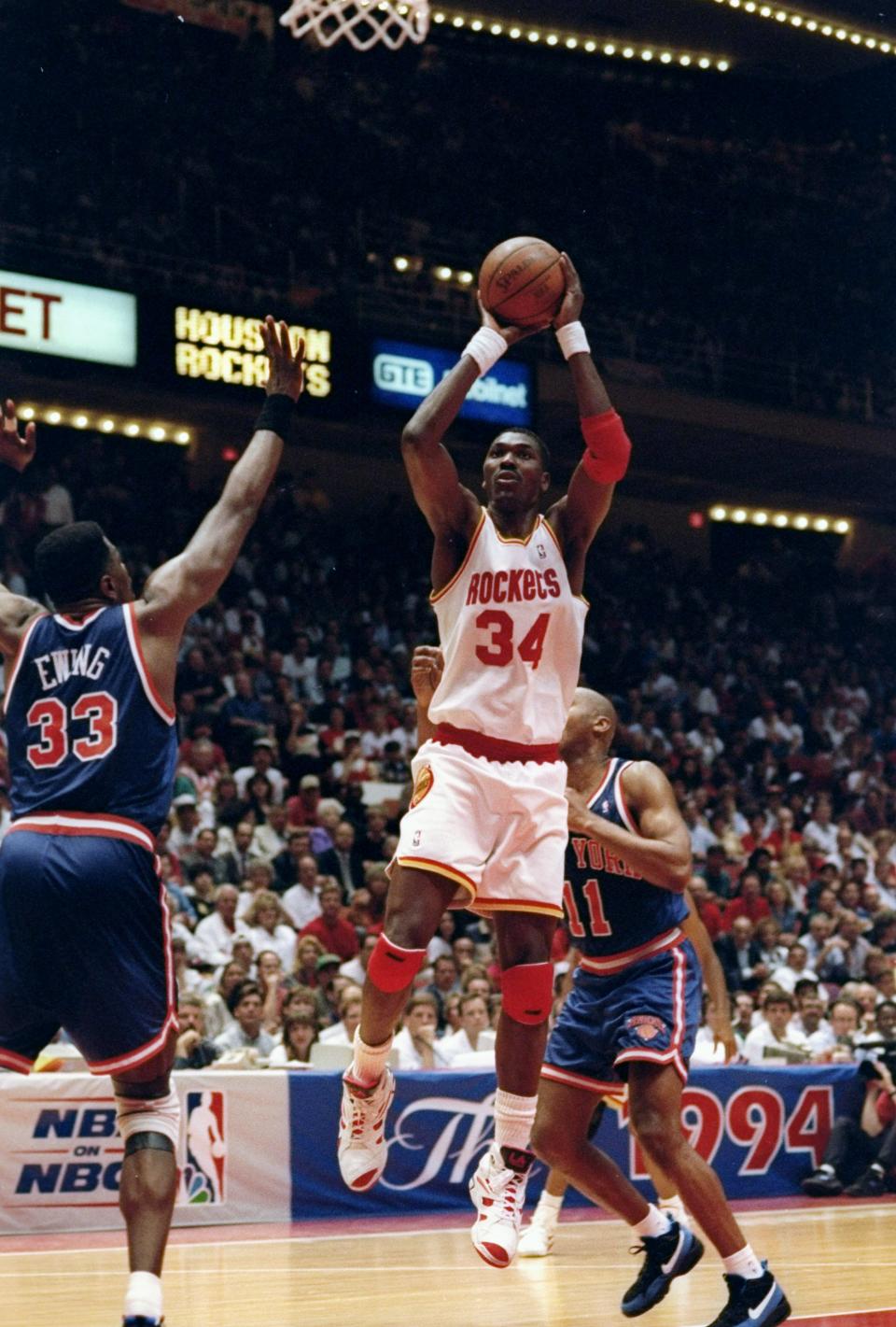
Playoff stats: 33.0 ppg, 10.3 rpg, 2.8 bpg and 53.1 FG% in 22 games
Playoff record: 15-7, NBA champion
We actually did research on this topic a few years back and found that this playoff run by Hakeem Olajuwon and the Houston Rockets was the toughest any NBA champion has ever had to face, at least according to opponent win percentage, as Olajuwon and Co. faced teams with a combined win percentage of 72.6 percent on their way to the ’96 title, the highest combined win percentage any eventual NBA champion has ever seen. The Rockets went 47-35 that regular season but were able to turn it on in the playoffs, defeating a 60-win Jazz team, a 62-win Spurs team (when Olajuwon went off on recently-minted league MVP David Robinson and absolutely demolished him in that series), a 59-win Suns team and a 57-win Magic team, all without home-court advantage, to win the championship that season. Olajuwon averaged 32.8 points, 11.5 rebounds, 5.5 assists, 2.0 steals and 2.0 blocks over a four-game sweep of Orlando in the Finals that year, on his way to Finals MVP. This is one of the most underrated playoff runs by a single player in NBA history.
Runner-ups: Clyde Drexler, Shaquille O’Neal
1994: Hakeem Olajuwon (Houston)

Playoff stats: 28.9 ppg, 11.0 rpg, 4.0 bpg and 51.9 FG% in 23 games
Playoff record: 15-8, NBA champion
Olajuwon’s road to the 1993-94 championship was not much easier, as the Rockets faced teams with a combined win percentage of 64.9 percent on their way to the 1994 title. The Finals were particularly dramatic, as the Rockets were down three games to two against the New York Knicks in the championship series before coming back to win it all in seven games. In the decisive Game 7, Olajuwon had 25 points, 10 rebounds, seven assists and three blocks, having a huge impact on the outcome despite shooting 10-for-25 from the floor.
Runner-ups: Patrick Ewing, Karl Malone
1993: Michael Jordan (Chicago)
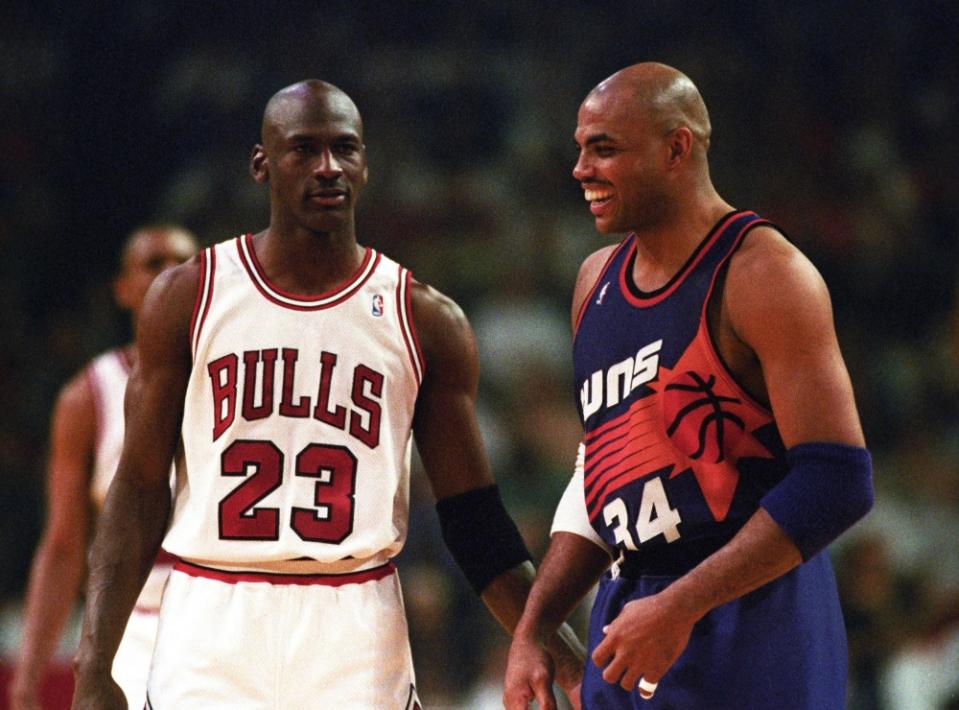
Playoff stats: 35.1 ppg, 6.7 rpg, 6.0 apg and 47.5 FG% in 19 games
Playoff record: 15-4, NBA champion
First threepeat Jordan was a slightly more selfish version of the legend than how he played during the second threepeat but goodness, the results were fun to watch. Jordan had a 54-point game (a pivotal Game 4 matchup against the Knicks with the Bulls down two games to one) and a 55-point game (Game 4 of the Finals against the Suns) in this playoff run, six games with at least 40 points and only failed to score at least 30 points six times over 19 games in this postseason. Sure, he shot the ball a whole lot at this point in his career but he was still very efficient and it led to a whole lot of wins for the Bulls.
Runner-ups: Charles Barkley, Hakeem Olajuwon
1992: Michael Jordan (Chicago)
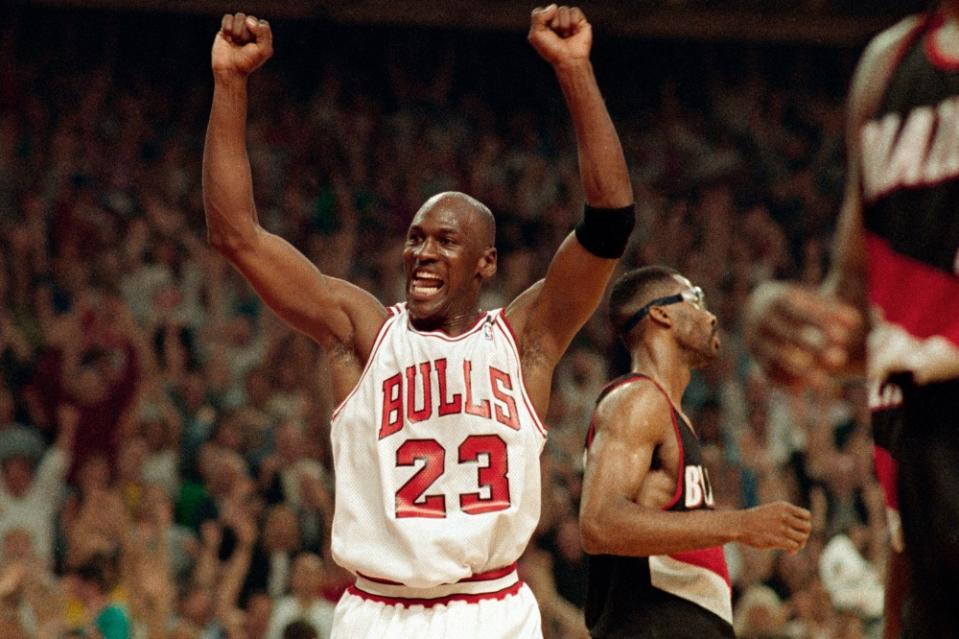
Playoff stats: 34.5 ppg, 6.2 rpg, 5.8 apg and 49.9 FG% in 22 games
Playoff record: 15-7, NBA champion
Another playoff run, another Playoff MVP for Jordan, as he earns that distinction for the 1992 postseason. Jordan had four 40-plus-point scoring games in this playoff run, including a 56-point explosion in Game 3 of the first round against Miami. Jordan’s best performance, however, might have been Game 5 of the Finals with the series against the Portland Trail Blazers tied at two games apiece. That night, Jordan came out to put a nail into the Blazers’ coffin, going off for 46 points on 14-of-23 shooting in what was a 119-106 win for the Bulls.
Runner-ups: Karl Malone, Clyde Drexler
1991: Michael Jordan (Chicago)
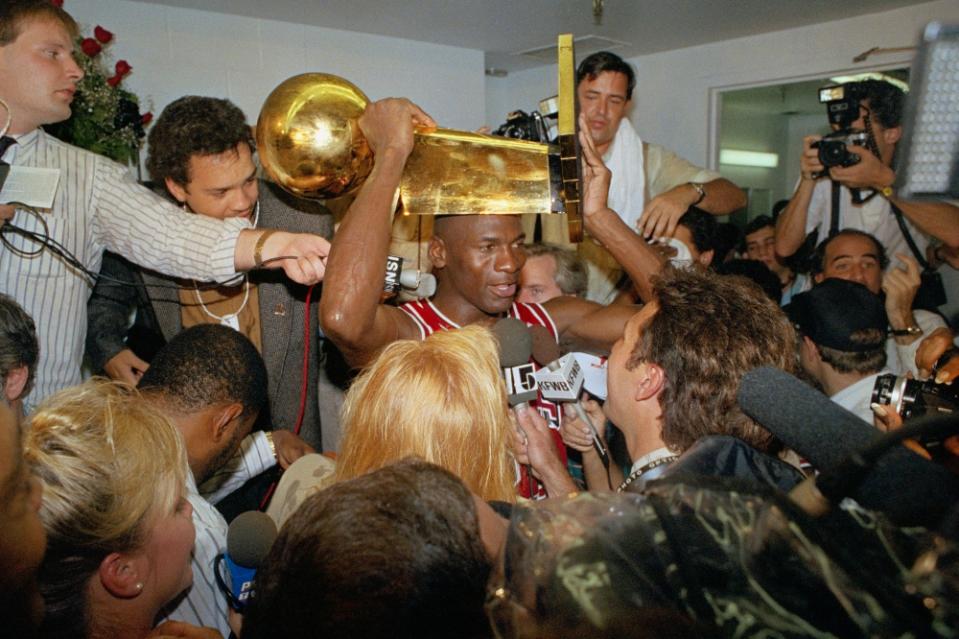
Playoff stats: 31.1 ppg, 6.4 rpg, 8.4 apg and 52.4 FG% in 17 games
Playoff record: 15-2, NBA champion
The 1991 playoffs were the first in which Jordan came out on top as NBA champion, finally breaking through to win a ring in his age-28 campaign. Jordan did his best job as a distributor in this playoff run in comparison to any of his career, putting up 8.4 assists over 17 games. He still had a few crazy performances in that playoff run, including a 38-point, 19-rebound, seven-assist outing in the deciding Game 4 victory over the Philadelphia 76ers in the second round.
Runner-ups: Scottie Pippen, Magic Johnson
1990: Michael Jordan (Chicago)

Playoff stats: 36.7 ppg, 7.2 rpg, 6.8 apg and 51.4 FG% in 16 games
Playoff record: 10-6, lost in Eastern Conference Finals (3-4 vs. Detroit)
It was a close call between Jordan and arch-nemesis Isiah Thomas, Detroit Pistons legend, for the honor of being named our 1990 Playoff MVP, made especially difficult by Thomas not just winning a title that year (and Finals MVP) but also defeating Jordan and the Bulls on his way to doing so. Still, Jordan’s numbers were hard to overlook when we made this selection, as a 37/7/7 stat line while taking the reigning champion Pistons to Game 7 of the Conference Finals is no joke.
Runner-ups: Isiah Thomas, Terry Porter
1989: Michael Jordan (Chicago)

Playoff stats: 34.8 ppg, 7.0 rpg, 7.6 apg and 51.0 FG% in 17 games
Playoff record: 9-8, lost in Eastern Conference Finals (2-4 vs. Detroit)
Despite not getting past the Conference Finals in 1989, we still went with Jordan as our Playoff MVP for that postseason. MJ had seven 40-plus-point scoring games over that playoff run, including a 50-point Game 4 showing against the Cavaliers in the first round, a three-point defeat for the Bulls. Facing elimination against Cleveland in the ensuing Game 5, Jordan hit his legendary jumper over Craig Ehlo to put Chicago up by one and send the Bulls through to the next round, for just two of his 44 points that night.
Runner-ups: Magic Johnson, Joe Dumars
1988: Magic Johnson (LA Lakers)

Playoff stats: 19.9 ppg, 12.6 apg, 5.4 rpg and 51.4 FG% in 24 games
Playoff record: 15-9, NBA champion
Although Magic Johnson didn’t win Final MVP in 1988, with the honor going to James Worthy instead, Johnson still wins Playoff MVP for 1988, according to us, as he was the best player for the entirety of that postseason run. Johnson had seven 15-plus-assist games, including a 15-point, 20-assist performance in Game 5 of the Conference Finals against the Mavericks. Johnson’s best game of that playoff run was probably Game 6 of the Finals against the Pistons, though, with the Lakers down three games to two. That night, Johnson went off for 22 points and 19 assists on just 12 shot attempts in what was a razor-tight 103-102 win for L.A.
Runner-ups: Michael Jordan, Larry Bird
1987: Magic Johnson (LA Lakers)

Playoff stats: 21.8 ppg, 12.2 apg, 6.2 rpg and 53.9 FG% in 18 games
Playoff record: 15-3, NBA champion
The last Lakers-Celtics Finals showdown of the ’80s ended with the Lakers coming out on top and with Johnson taking home Finals MVP honors after averaging 26.2 points, 8.0 rebounds, 13.0 assists and 2.3 steals over a six-game victory for Los Angeles. Johnson’s best performance of that playoff run was probably in the decisive Game 6 against Boston when he put up 16 points, eight rebounds, 19 assists and three steals to win the championship for the Lakers.
Runner-ups: Larry Bird, Hakeem Olajuwon
1986: Larry Bird (Boston)
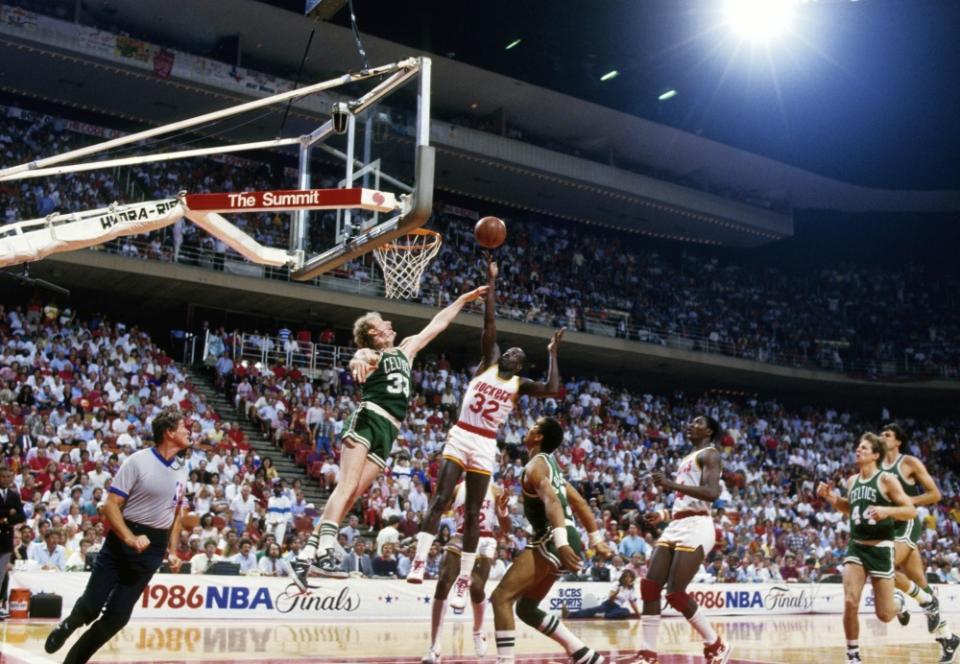
Playoff stats: 25.9 ppg, 9.3 rpg, 8.2 apg and 41.1% 3P% in 18 games
Playoff record: 15-3, NBA champion
Meanwhile, the final championship won by the Larry Bird Celtics dynasty of the ’80s came in 1986 over the Houston Rockets, who somewhat upset the Lakers in the Conference Finals that year. The Rockets, led by Olajuwon, were no match for the Celtics in the Finals, falling in six games after going down three games to one. Bird won Finals MVP for averaging 24.0 points, 9.7 rebounds, 9.5 assists and 2.7 seals in the championship series, including a 25-point, 15-rebound, 11-assist, four-steal showing in Game 4.
Runner-ups: Magic Johnson, Hakeem Olajuwon
1985: Magic Johnson (LA Lakers)
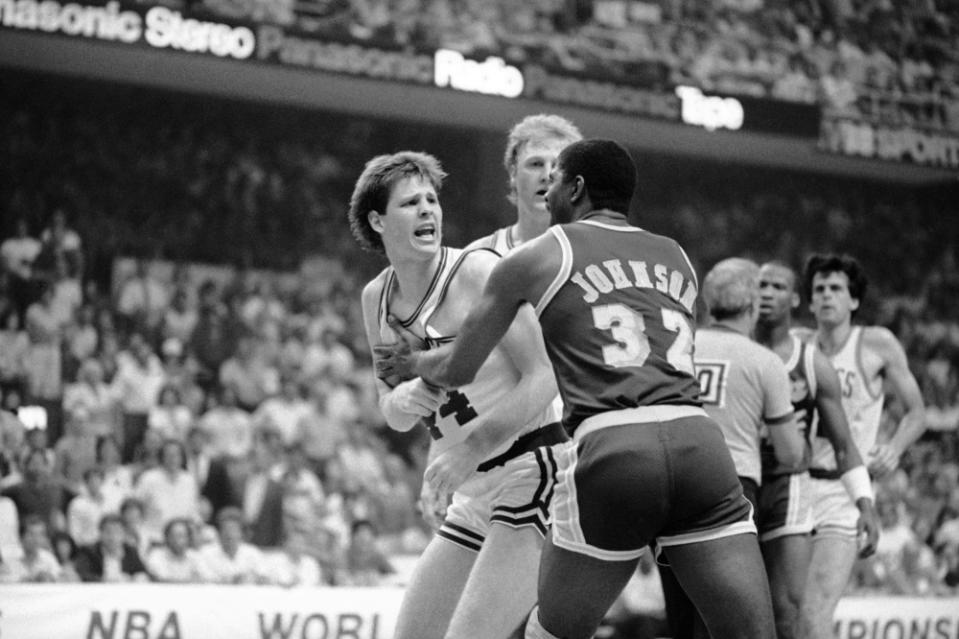
Playoff stats: 17.5 ppg, 15.2 apg, 7.1 rpg and 51.3 FG% in 19 games
Playoff record: 15-4 NBA champion
Although he didn’t win Finals MVP that year, Johnson is still our Playoff MVP for 1985, as he had a better overall postseason run than the Finals MVP, Kareem Abdul-Jabbar, did. Abdul-Jabbar put up 21.9 points, 8.1 rebounds and 4.0 assists in the 1985 postseason, numbers that were eclipsed by Johnson’s. It was a close call but Johnson was the engine behind the Lakers’ fast-break-heavy machine at that point, so we went with the supersized floor general as the pick here.
Runner-ups: Alex English, Larry Bird
1984: Larry Bird (Boston)

Playoff stats: 27.5 ppg, 11.0 rpg, 5.9 apg and 41.2 3P% in 23 games
Playoff record: 15-8, NBA champion
The second of Bird’s three championships came in 1984 when he and the Celtics beat the Lakers in a seven-game battle, one in which Bird was named Finals MVP for averaging 27.4 points, 14.0 rebounds, 3.6 assists, 2.1 steals and 1.1 blocks. Bird’s best performance of that playoff run came before that, though, against the Knicks in Game 7 of the second round when New York had a legit shot to knock off the dynastic Celtics of the era. In that decisive outing, Bird put up 39 points, 12 rebounds, 10 assists and three steals on 54.2 percent shooting in a performance that speaks to what a legend Bird was.
Runner-ups: Bernard King, Magic Johnson
1983: Moses Malone (Philadelphia)

Playoff stats: 26.0 ppg, 15.8 rpg, 1.5 apg and 53.6 FG% in 13 games
Playoff record: 12-1, NBA champion
We don’t have to remind Philadelphia fans of this but the last time the 76ers won a championship was in 1983, a title-winning run that was led by Moses Malone. Malone was a double-double machine at this point in his career, putting up historical rebounding numbers to go with 25-plus points nightly. He and the 76ers were so dominant this year, in fact, that they lost just one game that entire playoff run, falling in Game 4 of the Eastern Conference Finals to the Milwaukee Bucks after going up three games to zero.
Runner-ups: Julius Erving, Maurice Cheeks
1982: Magic Johnson (LA Lakers)
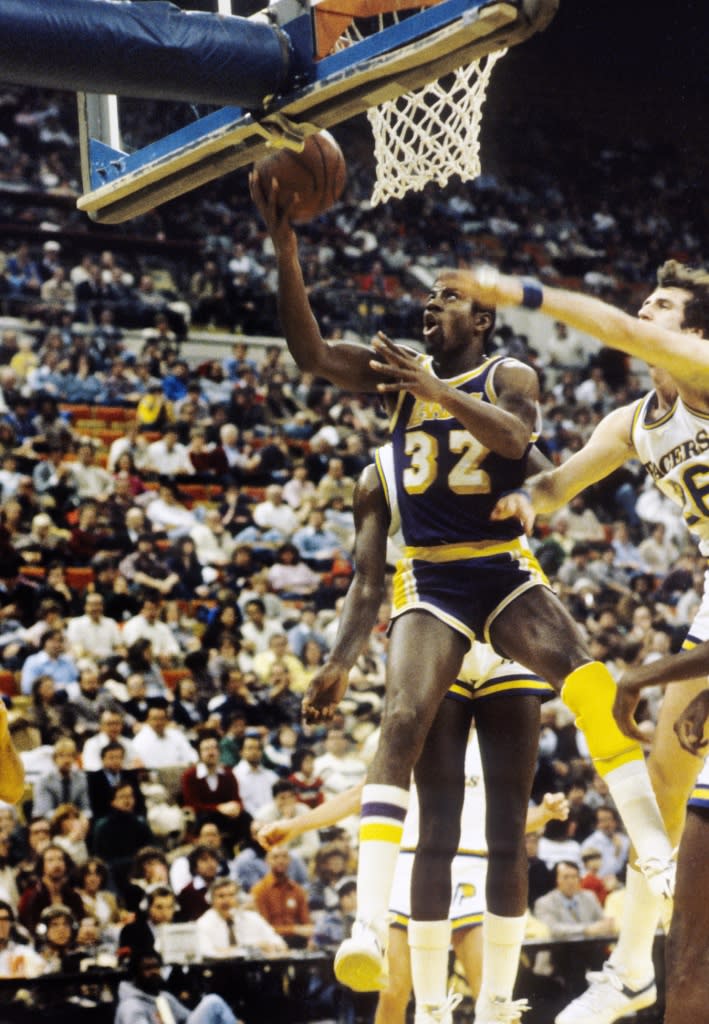
Playoff stats: 17.4 ppg, 11.3 rpg, 9.3 apg and 52.9 FG% in 14 games
Playoff record: 12-2, NBA champion
The Lakers, led by Johnson, were almost as dominant as the ’83 Sixers, but they lost two games on the way to their championship, zero before the Finals. Those two losses were to Philadelphia in the ’82 Finals, Game 2 and Game 5, the latter coming with the 76ers down three games to one already. In the deciding Game 6 of the championship series, Johnson – Finals MVP that year – went off for 13 points, 13 rebounds, 13 assists, four steals and two blocks to bring the championship back to Los Angeles.
Runner-ups: Kareem Abdul-Jabbar, Julius Erving
1981: Larry Bird (Boston)

Playoff stats: 21.9 ppg, 14.0 rpg, 6.1 apg and 37.5 3P% in 17 games
Playoff record: 12-5, NBA champion
The first championship of Bird’s career came in 1981, a year in which he also won Finals MVP. The most impressive part of this title run for Bird and Boston was the fact they fell down three games to one in round two against the 76ers but rallied back to win in seven games. The tide began to be turned in Game 5 when, facing elimination, Bird went off for 32 points, 11 rebounds, five assists, three steals and two blocks in what was a two-point victory for Boston. Over the final three games of that series, win-or-home situations for the Celtics, Bird averaged 26.7 points, 12.7 rebounds, 4.7 assists, 3.3 steals and 2.0 blocks, outrageous numbers considering the stakes.
Runner-ups: Moses Malone, Cedric Maxwell
1980: Kareem Abdul-Jabbar (LA Lakers)

Playoff stats: 31.9 ppg, 12.1 rpg, 3.1 apg and 57.2 FG% in 15 games
Playoff record: 12-4, NBA champion
Although much was made of the 1980 Finals, particularly the deciding Game 6 when a rookie-year Johnson stepped up for an injured Abdul-Jabbar and started at center while proceeding to have 42 points and 15 rebounds to win the championship for Los Angeles over Philadelphia, we’re still going with the Hall-of-Fame center and former all-time leading scorer as our Playoff MVP. There’s an argument to be made Abdul-Jabbar probably should have been Finals MVP that year, too, as over five games prior to getting hurt, the sky-hooking legend averaged 33.4 points, 13.6 rebounds, 3.2 assists and 4.6 blocks on nearly 55 percent shooting.
Runner-ups: Magic Johnson, Julius Erving
1979: Gus Williams (Seattle)
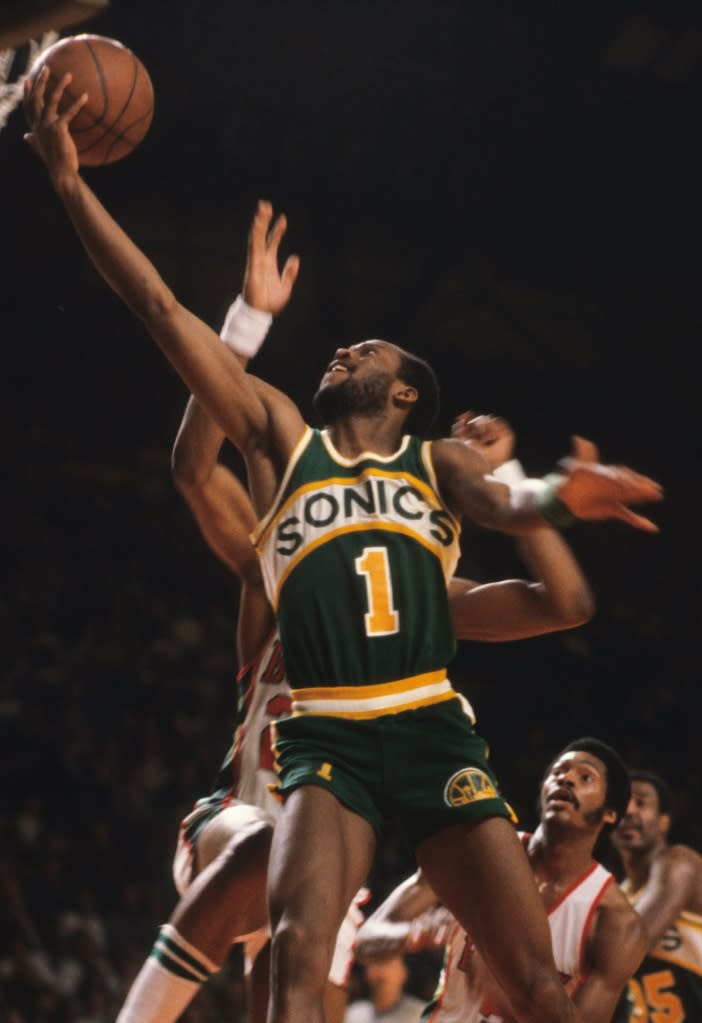
Playoff stats: 26.7 ppg, 4.1 rpg, 3.7 apg and 47.6 FG% in 17 games
Playoff record: 12-5, NBA champion
The least decorated player on this list so far by a mile, Gus Williams is our 1979 Playoff MVP. Williams wasn’t even Finals MVP that year, with that honor going to Dennis Johnson instead, but Williams’ overall postseason numbers were stronger than Johnson’s, which made our decision a bit easier. Williams’ best performance of that playoff run was arguably in Game 7 of the Conference Finals against the Suns when he had 29 points, three assists, two steals and two blocks to stave off elimination and advance to the Finals.
Runner-ups: Dennis Johnson, Jack Sikma
1978: Elvin Hayes (Washington)

Playoff stats: 21.8 ppg, 13.3 rpg, 2.0 apg and 49.1 FG% in 21 games
Playoff record: 14-7, NBA champion
One of the greatest rebounders of all time, Elvin Hayes was a monster in the 1978 playoffs en route to winning a championship with the then-Washington Bullets. Hayes had eight games with at least 15 rebounds in that postseason run to go with 14 games of at least 20 points. Hayes didn’t win Finals MVP that year, that honor went to Wes Unseld, but we felt Hayes had the stronger playoff run, including his 35-point, 19-rebound, two-steal, three-block performance in Game 4 of the Conference Finals against Philadelphia, a 16-point win for Washington.
Runner-ups: Marvin Webster, Bob Dandridge
1977: Bill Walton (Portland)

Playoff stats: 18.2 ppg, 15.2 rpg, 5.5 apg and 50.7 FG% in 19 games
Playoff record: 14-5, NBA champion
Prior to the injuries, Bill Walton was well on his way to being one of the best NBA big men of all time. We saw a glimpse of that in the 1977 playoffs when Walton dominated on his way to leading the Portland Trail Blazers to their lone franchise championship. Walton’s best game that postseason was in Game 3 of the Finals against Philadelphia when, with Portland down two games to zero, Walton had 20 points, 18 rebounds, nine assists and four blocks. In the decisive Game 6, Walton had another huge performance, going off for 20 points, 23 rebounds, seven assists and eight blocks.
Runner-ups: Maurice Lucas, Julius Erving
1976: Dave Cowens (Boston)

Playoff stats: 21.0 ppg, 16.4 rpg, 4.6 apg and 45.7 FG% in 18 games
Playoff record: 12-6, NBA champion
Florida State legend and one-time league MVP Dave Cowens was the best player of the 1976 playoffs, even despite not winning Finals MVP that year, with that honor going to Jo Jo White instead. His biggest performance of that postseason came in Game 5 of the Finals against the Suns, with the series tied at two games apiece. That game, then called “The Greatest Game Ever Played”, went to triple-overtime and ended with a 128-126 victory for Boston, which eventually won the series in six. In Game 5, Cowens had 26 points, 19 rebounds and four rebounds before fouling out. Cowens also had a historic 29-point, 26-rebound, eight-assist in Game 4 against the Buffalo Braves.
Runner-ups: Jo Jo White, Paul Silas
1975: Rick Barry (Golden State)
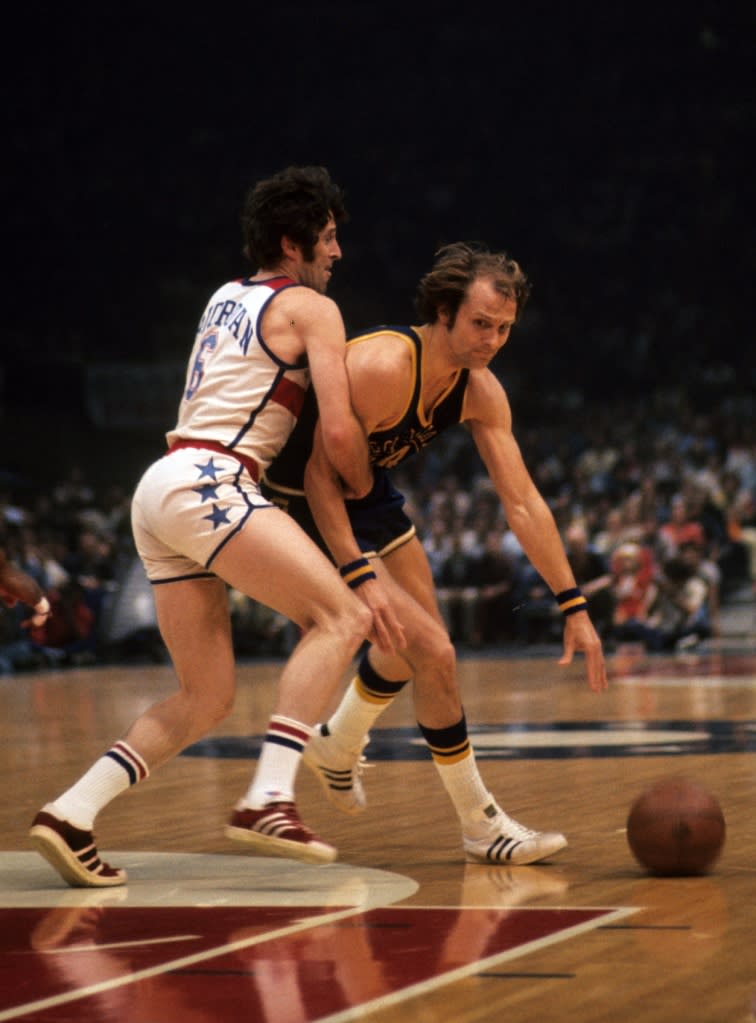
Playoff stats: 28.2 ppg, 5.5 rpg, 6.1 apg and 44.4 FG% in 17 games
Playoff record: 12-5, NBA champion
One of the all-time do-everything swingmen in the NBA, Rick Barry is our 1975 Playoff MVP for a stretch of play in which Barry proved he was arguably the best non-center in the league. Barry had eight games of at least 30 points in that playoff run, including a 39-point, 11-assist, eight-steal performance to open up that postseason. Barry also won Finals MVP after making quick work of the Bullets, leading the Warriors to a sweep by averaging 29.5 points, 5.0 assists and 3.5 steals.
Runner-ups: Elvin Hayes, Jamaal Wilkes
1974: Kareem Abdul-Jabbar (Milwaukee)

Playoff stats: 32.2 ppg, 15.8 rpg, 4.9 apg and 55.7 FG% in 16 games
Playoff record: 11-5, lost in Finals (3-4 vs. Boston)
Despite not winning the championship that year, Abdul-Jabbar is our Playoff MVP pick for 1974, putting up enormous numbers and pushing the more talented and experienced Celtics to seven games in the Finals. The championship series saw Abdul-Jabbar average 32.6 points, 12.1 rebounds, 5.4 assists and 2.1 blocks that year, coming close to leading the Bucks to the upset victory.
Runner-ups: John Havlicek, Dave Cowens
1973: Walt Frazier (New York)
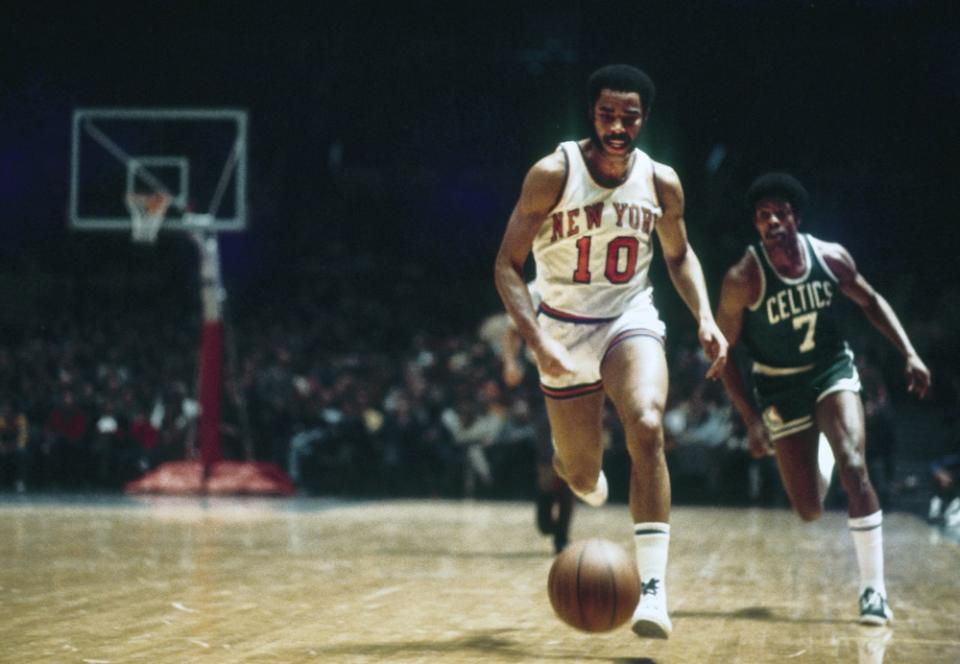
Playoff stats: 21.9 ppg, 7.3 rpg, 6.2 apg and 51.4 FG% in 17 games
Playoff record: 12-5, NBA champion
He wasn’t Finals MVP that year, Willis Reed was, but Hall-of-Fame guard Walt Frazier is still our pick for 1973 Playoff MVP, as he put up the best numbers and had the most impressive performances. Frazier’s best game came in Game 4 against the Celtics in the conference finals when he put up 37 points, nine rebounds and four assists in a seven-point win for the Knicks. In the deciding Game 7 against Boston, Frazier was equally great, putting up 25 points, 10 rebounds and seven assists as the Knicks won by 16 to advance to the Finals.
Runner-ups: Wilt Chamberlain, Dave DeBusschere
1972: Wilt Chamberlain (LA Lakers)

Playoff stats: 14.7 ppg, 21.0 rpg, 3.3 apg and 56.3 FG% in 15 games
Playoff record: 12-3, NBA champion
The 1972 Finals MVP also earns the honor of being our Playoff MVP for that year, as Wilt Chamberlain was instrumental in the Lakers breaking through for the first championship since their Minneapolis days, a 17-year stretch without titles for the franchise. Chamberlain was spectacular in the championship series, averaging 19.4 points and 23.2 rebounds in the five-game victory for L.A.
Runner-ups: Jerry West, Walt Frazier
1971: Kareem Abdul-Jabbar (Milwaukee)
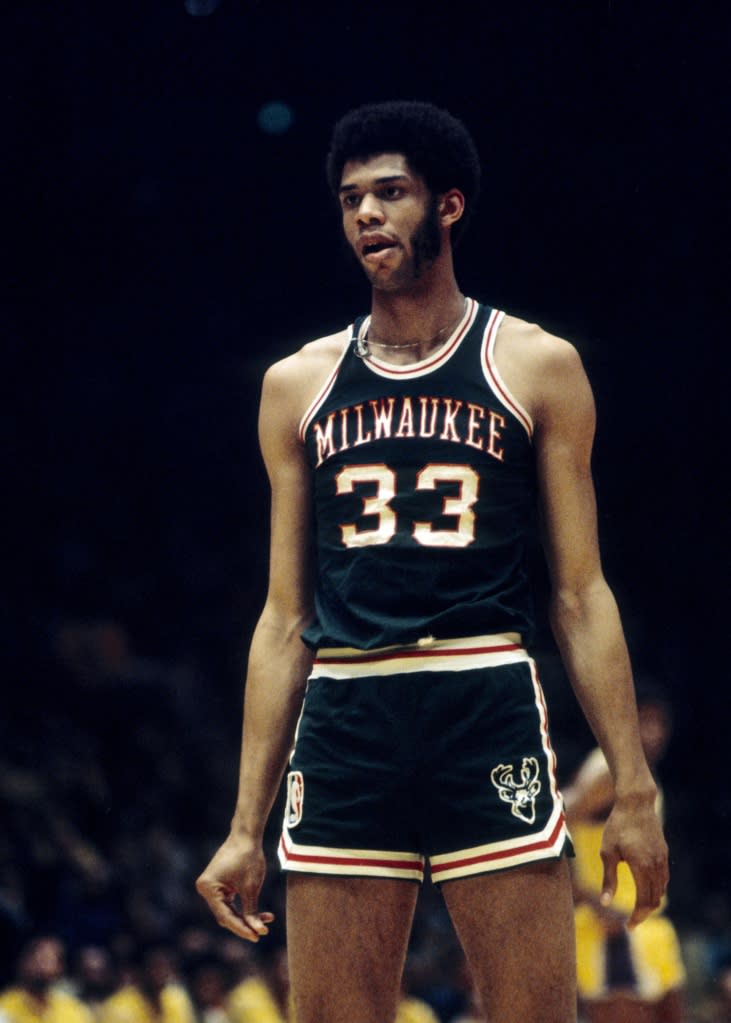
Playoff stats: 26.6 ppg, 17.0 rpg, 2.5 apg and 51.5 FG% in 14 games
Playoff record: 12-2, NBA champion
In just his second season, Abdul-Jabbar was already the regular-season MVP, and Finals MVP. He was dominant during this playoff run with the Bucks, as Milwaukee lost just two games on its way to the championship. Abdul-Jabbar averaged 27.0 points, 18.5 rebounds and shot 60.5 percent from the floor in the four-game sweep for the Bucks over the then-Baltimore Bullets in the championship series.
Runner-ups: Oscar Robertson, Bob Dandridge
1970: Wilt Chamberlain (LA Lakers)

Playoff stats: 22.1 ppg, 22.2 rpg, 4.5 apg and 54.9 FG% in 18 games
Playoff record: 11-7, lost in Finals (3-4 vs. New York)
Despite not winning the championship or Finals MVP, we’re still going with Chamberlain as Playoff MVP for 1970, over Reed, who did win Finals MVP that year as the Knicks defeated Chamberlain’s Lakers in seven games for the title. This was also a close call with West, who averaged over 31 points and seven assists in the Finals defeat that year. Still, Chamberlain’s numbers were huge that postseason and he was unstoppable on the glass to go with his high level of scoring.
Runner-ups: Jerry West, Willis Reed
1969: Wilt Chamberlain (LA Lakers)

Playoff stats: 13.9 ppg, 24.7 rpg, 2.6 apg and 54.5 FG% in 18 games
Playoff record: 11-7, lost in Finals (3-4 vs. Boston)
Once again, we had to go with Chamberlain as our Playoff MVP for another campaign in which his team, the Lakers, didn’t win the title, nor in which he won Finals MVP. The Celtics won the championship that year while Chamberlain’s teammate, West, was actually the Finals MVP. But Chamberlain dominated the glass in this postseason run, too, securing at least 20 rebounds in 13 of his 18 playoff games that year, and was the most unstoppable player in that postseason, at least in that regard.
Runner-ups: John Havlicek, Jerry West
1968: Elgin Baylor (LA Lakers)

Playoff stats: 28.5 ppg, 14.5 rpg, 4.0 apg and 46.8 FG% in 15 games
Playoff record: 10-5, lost in Finals (2-4 vs. Boston)
Baylor would retire due to injuries before being able to win a championship but at his peak, he was the best non-center in the league. His style of play, slashing, and relentless attacking with a level of athleticism the NBA hadn’t seen before was one-of-a-kind and set the table for future dominant wings. In the 1968 playoffs, Baylor had eight games of 20-plus points and 15-plus rebounds on his way to leading the Lakers to a six-game defeat in the Finals to the Celtics.
Runner-ups: Bill Russell, Wilt Chamberlain
1967: Wilt Chamberlain (Philadelphia)

Playoff stats: 21.7 ppg, 29.1 rpg, 9.0 apg and 47.9 FG% in 15 game
Playoff record: 11-4, NBA champion
The first of Chamberlain’s two career championships came in 1967, a year in which we named him Playoff MVP and when he almost certainly would have won Finals MVP, had the award been around by then. In the championship series, Chamberlain led the Sixers to a six-game win over the then-San Francisco Warriors, averaging 17.7 points, 28.5 rebounds and 6.8 assists in that stretch. Chamberlain grabbed at least 22 rebounds in every game those playoffs, including a 41-rebound Game 3 performance against the Celtics to go with 20 points and nine assists that day.
Runner-ups: Nate Thurmond, Rick Barry
1966: Bill Russell (Boston)

Playoff stats: 19.1 ppg, 25.2 rpg, 5.0 apg and 47.5 FG% in 17 games
Playoff record: 11-6, NBA champion
In 17 playoff games in 1966, Bill Russell had 13 games of at least 20 rebounds and four of at least 30 to go with his nearly 20 points scored nightly. He also distributed at an elite level for a center of his era while playing the outstanding defense he is most fondly remembered for. In the decisive Game 7 victory over the rival Lakers in the Finals that year, Russell had 25 points and 32 rebounds, and likely would have won Finals MVP had the award existed at that point.
Runner-ups: Jerry West, John Havlicek
1965: Bill Russell (Boston)

Playoff stats: 16.5 ppg, 25.2 rpg, 6.3 apg and 52.7 FG% in 12 games
Playoff record: 8-4, NBA champion
The winningest player in NBA history, Russell also earns Playoff MVP honors for his contributions to the Celtics’ 1965′ title run when he put up a 16/25/6 stat line. Russell was clutch in this postseason, having to defend Chamberlain and the Sixers before getting to the Finals, a battle that went to seven games with Russell having 15 points, 29 rebounds and eight assists in the decisive Game 7, a one-point victory for Boston. He probably had a gajillion blocks that night, too, but we don’t know that for sure since blocks weren’t tracked back then. In the Finals, a six-game victory over the Lakers, Russell averaged 17.8 points, 25.0 rebounds and 5.8 assists.
Runner-ups: Wilt Chamberlain, Sam Jones
1964: Bill Russell (Boston)

Playoff stats: 13.1 ppg, 27.2 rpg, 6.7 apg and 35.6 FG% in 10 games
Playoff record: 8-2, NBA champion
The 1964 playoffs were a bit less stressful for Russell and Co., as Boston won each series in five games, including the Finals against the then-San Francisco Warriors, Chamberlain’s team at the time. Against Chamberlain in the championship series, Russell averaged just 11.2 points but chipped in with 25.2 rebounds and 5.0 assists, as well as with likely a whole bunch of steals and blocks, dominating defensively and on the glass as the Celtics brought the championship to Boston yet again.
Runner-ups: Wilt Chamberlain, Sam Jones
1963: Bill Russell (Boston)

Playoff stats: 20.3 ppg, 25.1 rpg, 5.1 apg and 45.3 FG% in 13 games
Playoff record: 8-5, NBA champion
Once again, Russell is named our Playoff MVP, this time for his production in the 1963 postseason. Russell and the Celtics had to go through an absolute war against the then-Cincinnati Royals before reaching the Finals, a seven-game battle against Oscar Robertson and Jack Twyman that saw Russell and Co. come out on top. Without Russell, there’s no chance Boston would have gotten by the Royals, not with how Robertson and Twyman were playing and not without Russell’s huge rebounding and scoring marks. Russell is better remembered for his crazy rebounding and defense but at this point in his career, he was also a great scorer, especially in transition, and an underrated playmaker.
Runner-ups: Oscar Robertson, Bob Pettit
1962: Bill Russell (Boston)
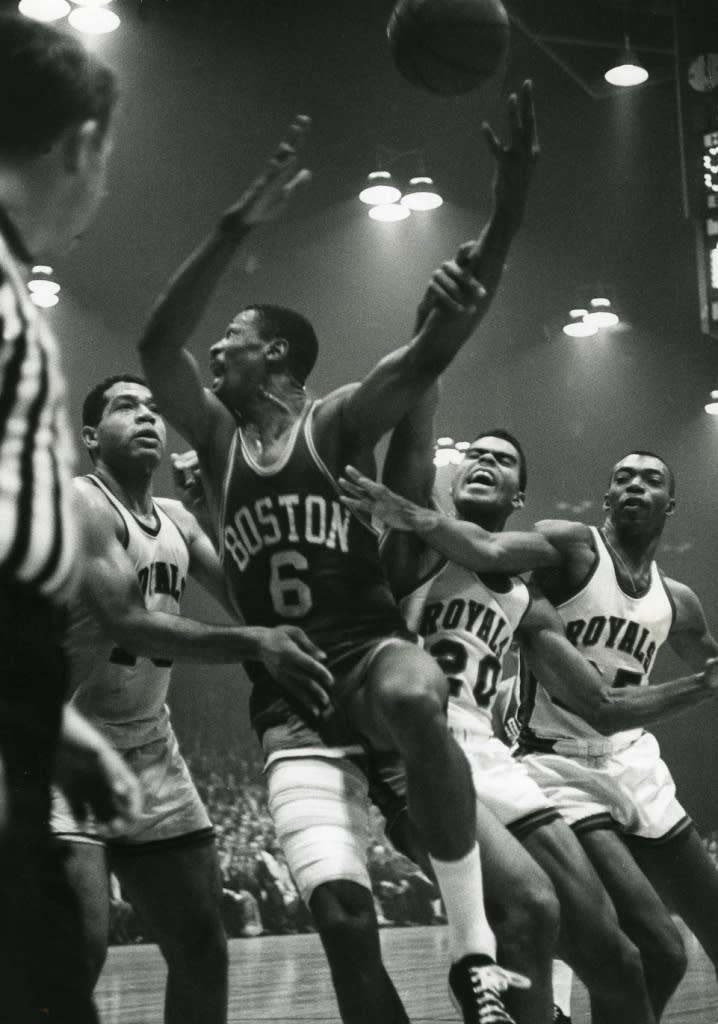
Playoff stats: 22.4 ppg, 26.4 rpg, 5.0 apg and 45.8 FG% in 14 games
Playoff record: 8-6, NBA champion
Russell and the Celtics had to win two seven-game series to get the championship in 1962, first facing Chamberlain, Paul Arizin and the then-Philadelphia Warriors before taking on West, Baylor and the Lakers in the Finals. Particularly brutal for the Lakers is the fact they actually went up three games to two and had Game 6 coming up in Los Angeles. They blew that game by 14 points before a historical Russell performance in Game 7 – he went off for 30 points and 40 rebounds in that outing – saw Boston win the title, taking Game 7 110-107.
Runner-ups: Wilt Chamberlain, Elgin Baylor
1961: Bill Russell (Boston)
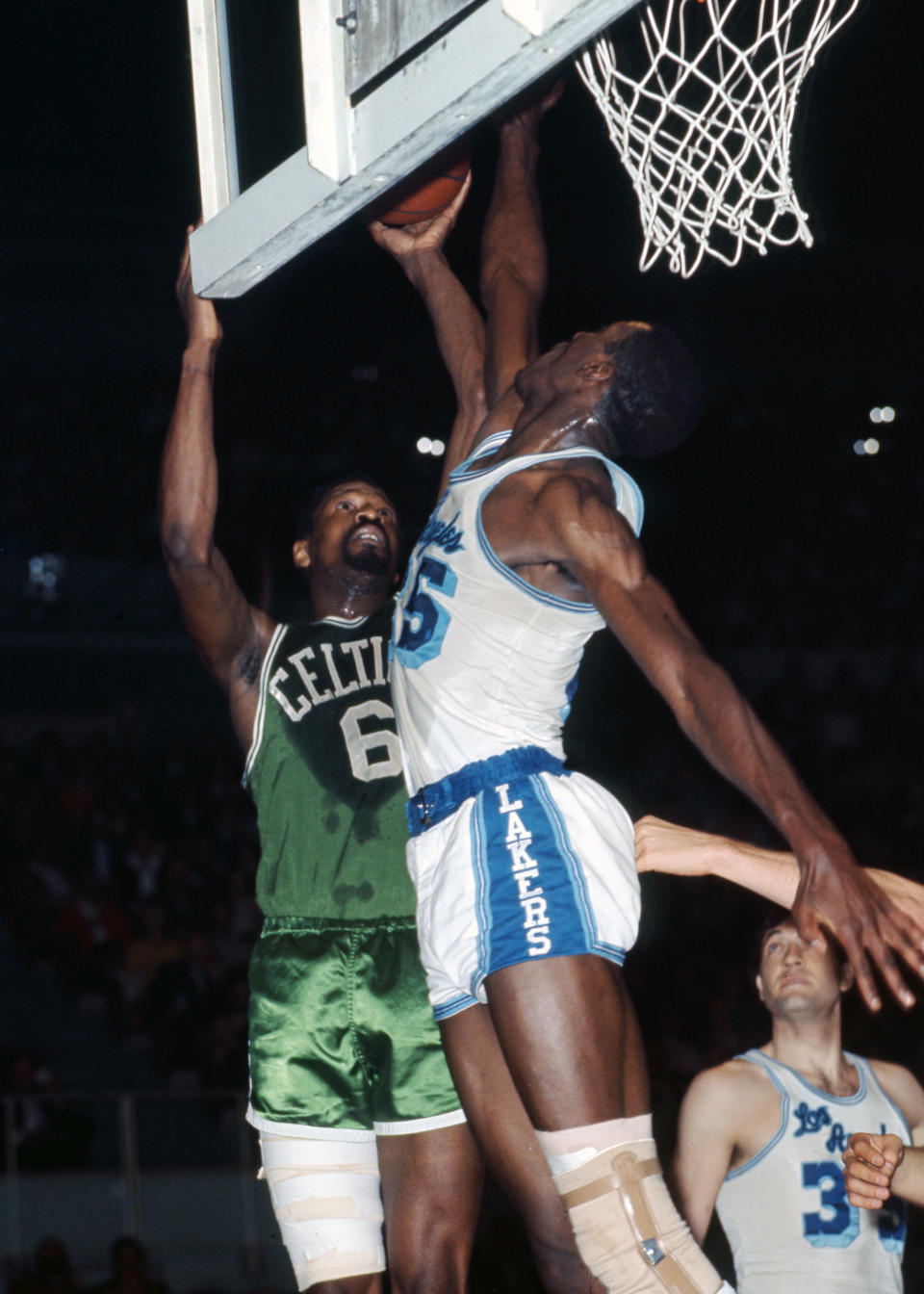
Playoff stats: 19.1 ppg, 29.9 rpg, 4.8 apg and 42.7 FG% in 10 games
Playoff record: 8-2, NBA champion
Russell, our pick for Playoff MVP for 1961, had at least 30 rebounds in half of his games in that postseason run but at least 23 boards in every playoff game that year. The Celtics lost just one playoff game in each series on their way to the championship that season, defeating the St. Louis Hawks in five games in the Finals with Russell going off for 30 points and 38 rebounds in the closeout Game 5.
Runner-ups: Elgin Baylor, Bob Cousy
1960: Bill Russell (Boston)
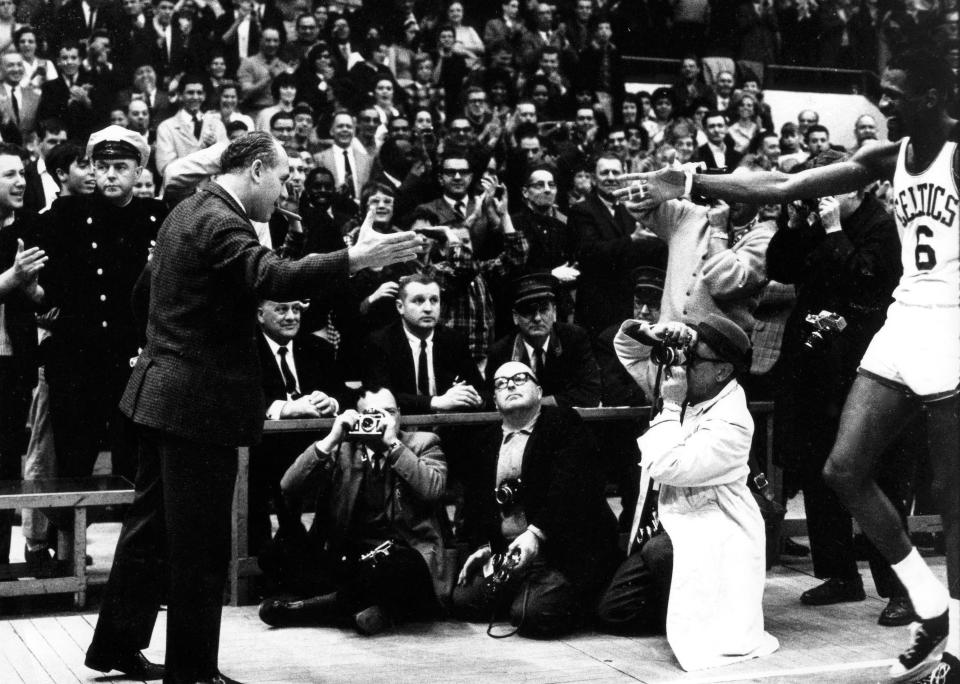
Playoff stats: 18.5 ppg, 25.8 rpg, 2.9 apg and 45.6 FG% in 13 games
Playoff record: 8-5, NBA champion
The 1960 Finals were a hard-fought affair, one that saw the Celtics come out on top in seven games over the St. Louis Hawks, with Russell averaging 16.7 points, 24.9 rebounds and 3.0 assists in the series, closing the Finals out with a 22-point, 35-rebound explosion in Game 7.
Runner-ups: Wilt Chamberlain, Bob Pettit
1959: Bill Russell (Boston)

Playoff stats: 15.5 ppg, 27.7 rpg and 40.9 FG% in 11 games
Playoff record: 8-3, NBA champion
Facing off with the Minneapolis Lakers before the rivalry really exploded, the Celtics won the 1959 championship in four games behind Russell’s 9.3 points and 29.5 rebounds per game. Between Games 2 and 4 of the series, Russell had exactly 30 rebounds in each performance, numbers that are unheard of today.
Runner-ups: Bob Cousy, Frank Ramsey
1958: Cliff Hagan (St. Louis)

Playoff stats: 27.7 ppg, 10.5 rpg, 3.4 apg and 50.2 FG% in 11 games
Playoff record: 8-3, NBA champion
An unstoppable swingman in his era, Cliff Hagan was the best player of the 1958 playoffs, a year in which the St. Louis Hawks won the championship by beating Boston in six games in the Finals. Hagan averaged 25.2 points and 9.7 rebounds in the championship series.
Runner-ups: Bill Russell, Bob Pettit
1957: Bill Russell (Boston)
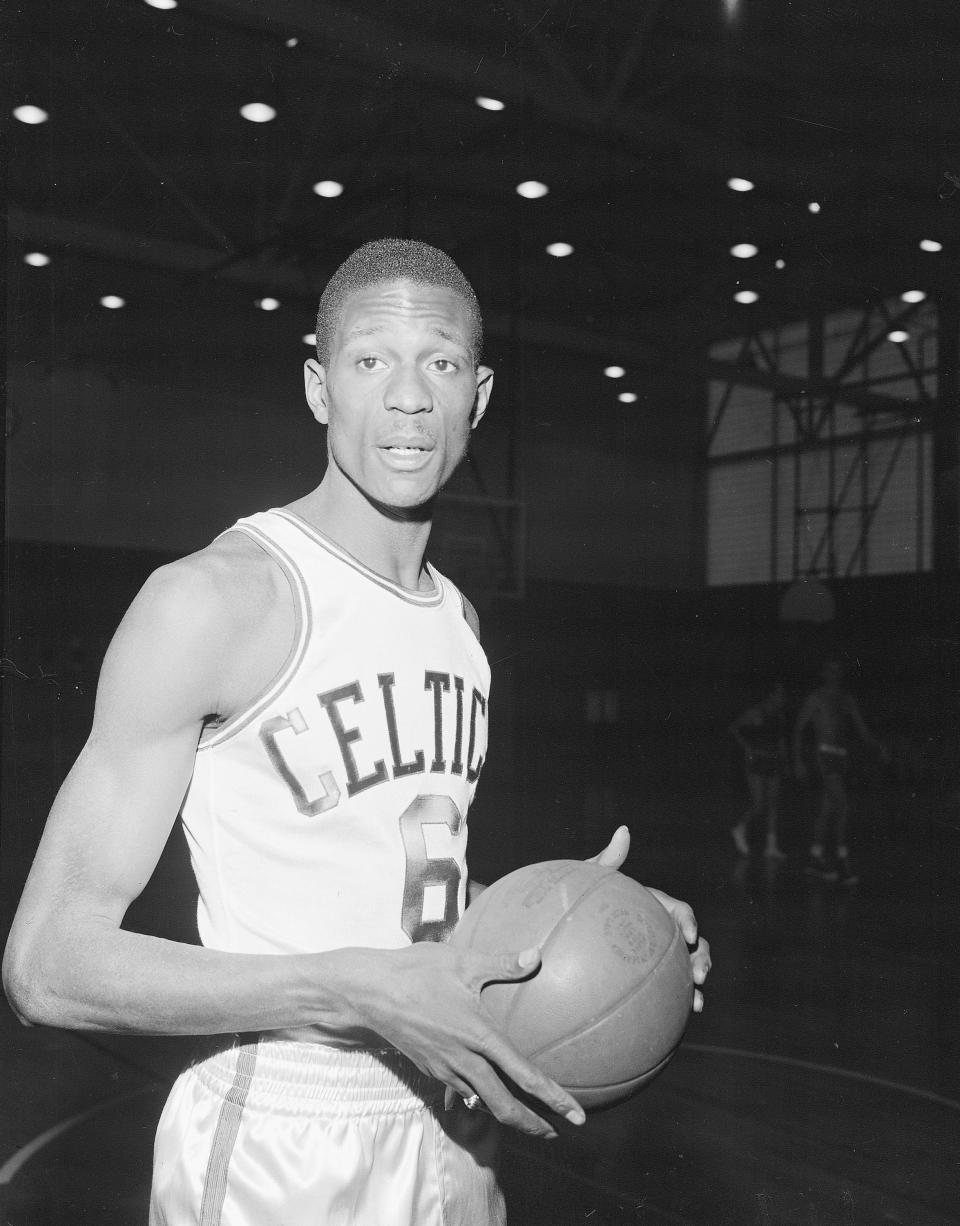
Playoff stats: 13.9 ppg, 24.4 rpg, 3.2 apg and 36.5 FG% in 10 games
Playoff record: 7-3, NBA champion
Rookie-year Russell is our 1957 Playoff MVP thanks to his guiding Boston to the championship after defeating St. Louis in a brutal seven-game Finals series. Russell averaged 13.3 points and 22.9 rebounds in that series while securing at least 30 rebounds three times.
Runner-ups: Bob Pettit, Tom Heinsohn
1956: Paul Arizin (Philadelphia)
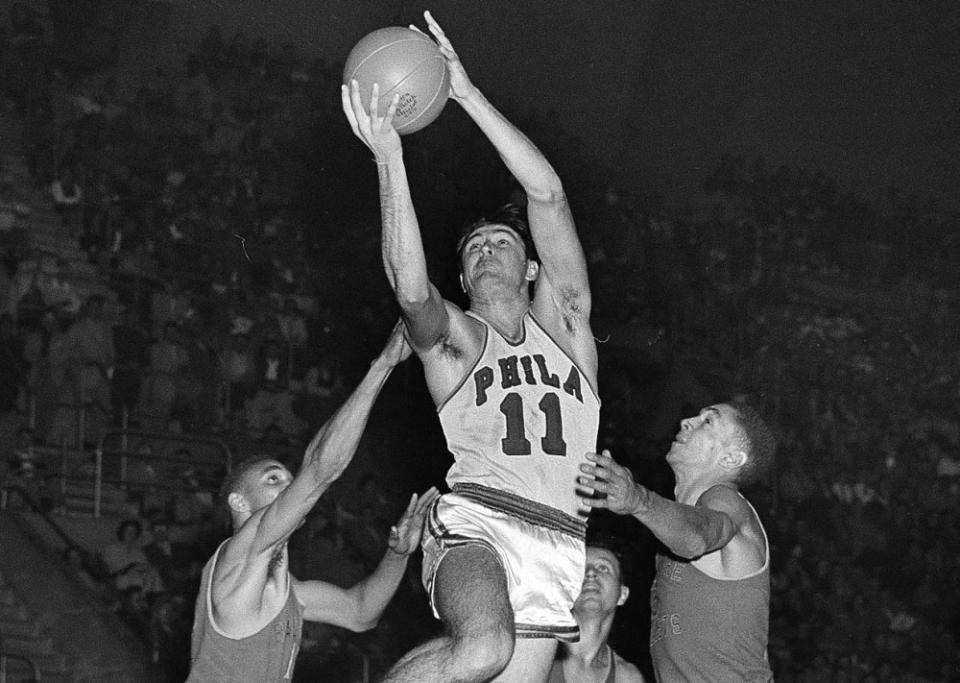
Playoff stats: 28.9 ppg, 8.4 rpg, 2.9 apg and 45.0 FG% in 10 games
Playoff record: 7-3, NBA champion
Hall-of-Fame swingman Paul Arizin is our pick for 1956 Playoff MVP for helping lead the Philadelphia Warriors to the title, defeating the Fort Wayne Pistons in five games in the Finals that year. In the championship series, Arizin put up 27.8 points and 8.0 rebounds per game.
Runner-ups: Neil Johnston, Tom Gola
1955: Dolph Schayes (Syracuse)
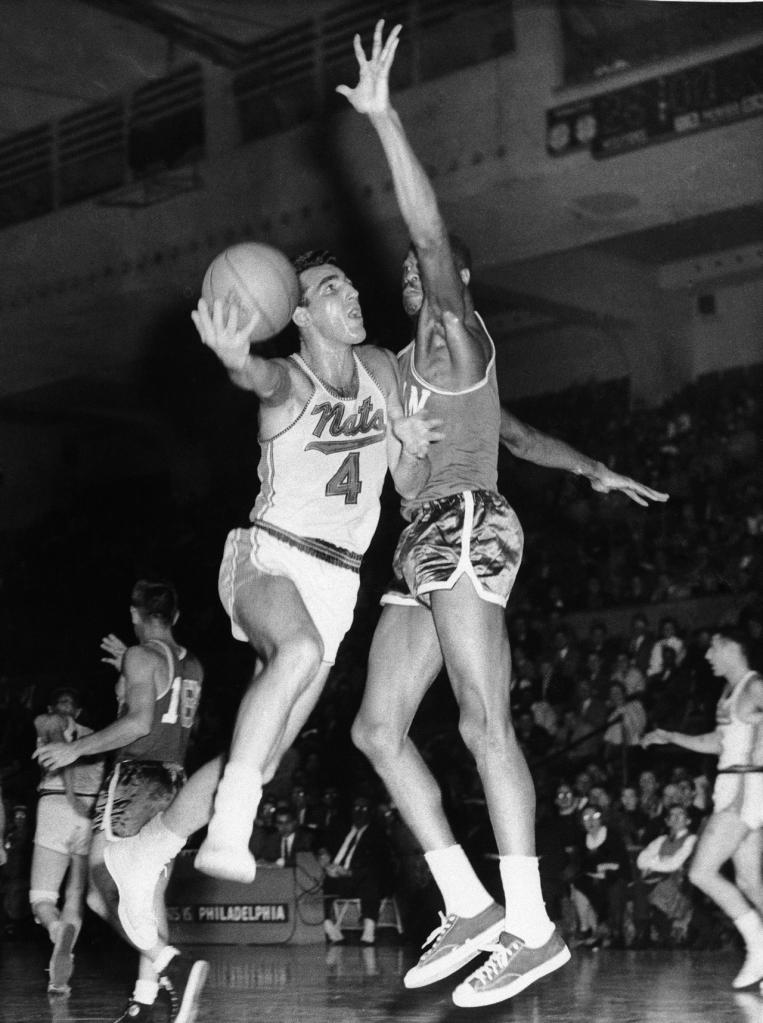
Playoff stats: 19.0 ppg, 12.8 rpg, 3.6 apg and 35.9 FG% in 11 games
Playoff record: 7-4, NBA champion
Hall-of-Fame center Dolph Schayes helped lead the Syracuse Nationals to the 1955 championship over the Fort Wayne Pistons, despite the Nationals falling behind three games to two in the Finals. Facing elimination in Game 6, Schayes went off for 28 points, 12 rebounds and five assists to force Game 7, when Schayes and Co. were able to finish the job.
Runner-ups: Red Kerr, George Yardley
1954: George Mikan (Minneapolis)
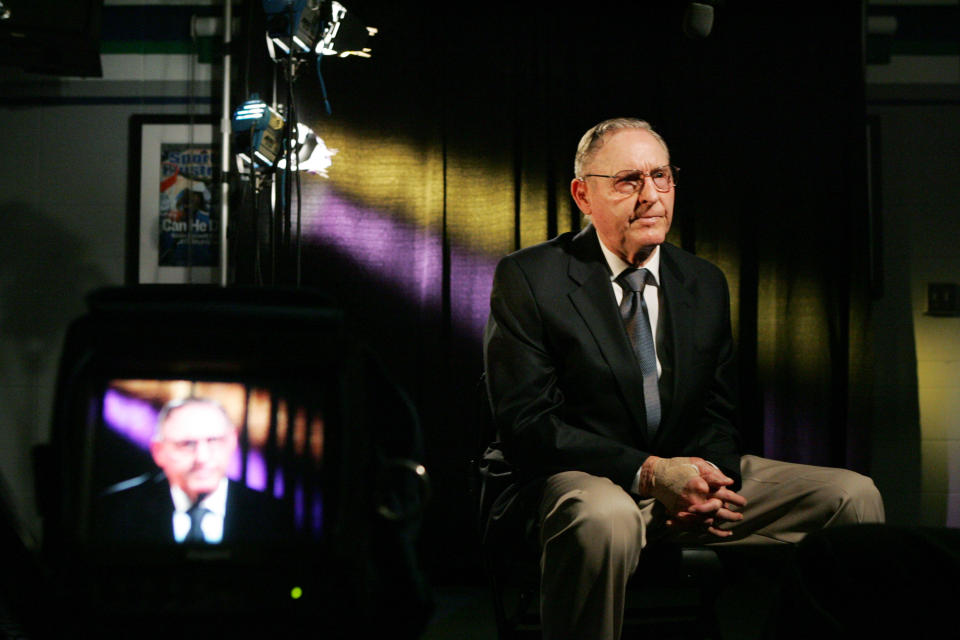
Playoff stats: 19.4 ppg and 81.3 FT% in 13 games
Playoff record: 9-4, NBA champion
The Minneapolis Lakers won the 1954 championship thanks to George Mikan – the original all-time great Laker center – and his 18.1 points and 13.1 rebounds in the Finals, a seven-game victory for Minneapolis over the Syracuse Nationals.
Runner-ups: Dolph Schayes, Wally Osterkorn
1953: George Mikan (Minneapolis)

Playoff stats: 19.8 ppg, 15.4 rpg, 1.9 apg and 36.6 FG% in 12 games
Playoff record: 9-3, NBA champion
The original elite Laker big man Mikan is also our pick for 1953 Playoff MVP for a postseason campaign in which he led Minneapolis to the championship, averaging 20.8 points in the five-game Finals victory over the Knicks.
Runner-ups: Jim Pollard, Vern Mikkelsen
1952: George Mikan (Minneapolis)
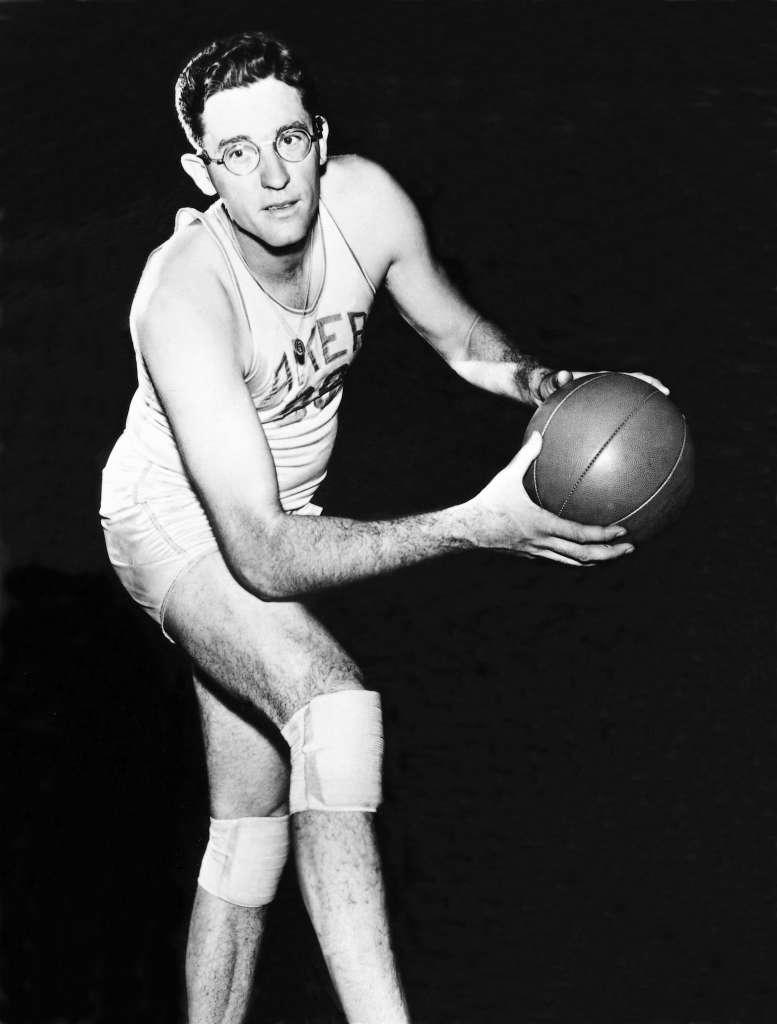
Playoff stats: 23.6 ppg, 15.9 rpg, 2.8 apg and 37.9 FG% in 13 games
Playoff record: 9-4, NBA champion
Mikan likewise earns the distinction for 1952, another year that saw the Lakers win the title. It took seven games for Mikan and Co. to defeat the Knicks in the Finals that year, though, with Mikan averaging 21.7 points and 17.4 rebounds in the championship series, including going for 22 points and 19 rebounds in the decisive Game 7.
Runner-ups: Vern Mikkelsen, Connie Simmons
1951: Arnie Risen (Rochester)
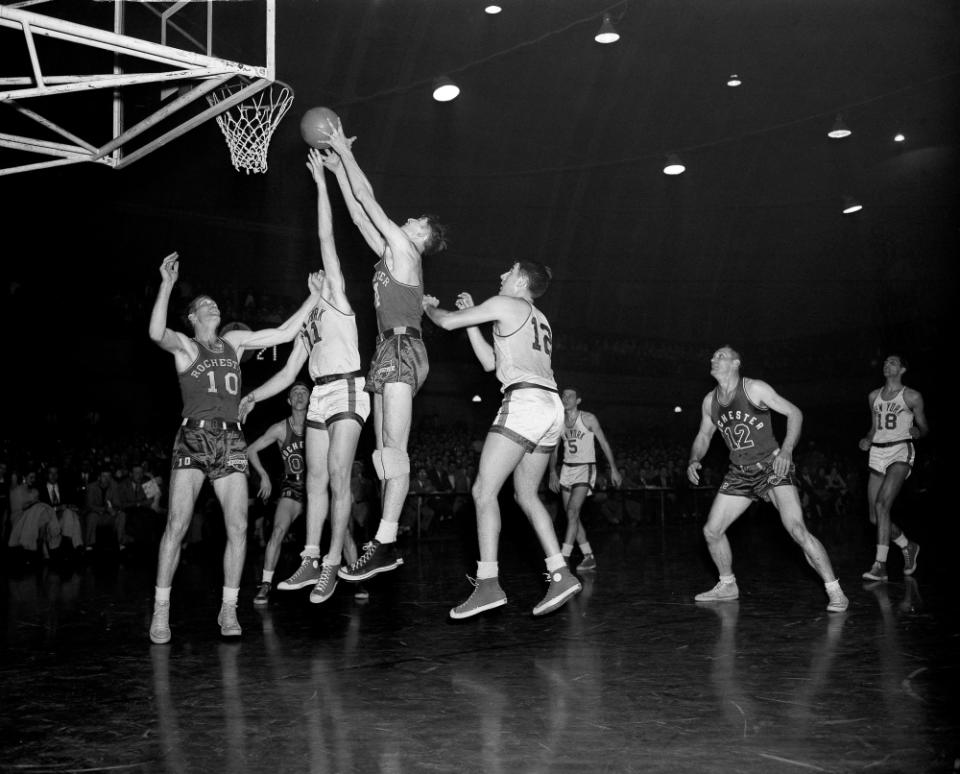
Playoff stats: 19.5 ppg, 14.0 rpg, 2.4 apg and 38.9 FG% in 14 games
Playoff record: 9-5, NBA champion
The 1951 Finals were an exciting affair, with Hall-of-Famer Arnie Risen’s Rochester Royals going up three games to zero before seeing the Knicks storm back to even the series at three games apiece. Risen and the Royals bounced back in Game 7, though, with Risen leading the way, scoring 24 points and securing 13 rebounds to secure the win, and championship, for Rochester.
Runner-ups: Bobby Wanzer, George Mikan
1950: George Mikan (Minneapolis)

Playoff stats: 31.3 ppg, 3.0 apg, 38.3 FG% and 78.8 FT% in 12 games
Playoff record: 10-2, NBA champion
The NBA’s leading scorer in 1950, Mikan continued that excellent run of form in the playoffs. He led the Lakers to the championship, averaging 32.2 points in the Finals, a six-game victory over the Syracuse Nationals which saw Mikan go off for 40 points in the decisive Game 6.
Runner-ups: Dolph Schayes, Vern Mikkelsen
1949: George Mikan (Minneapolis)

Playoff stats: 30.3 ppg, 2.1 apg, 45.4 FG% and 80.2 FT% in 10 games
Playoff record: 8-2, BAA champion
Rookie-year Mikan was a star right away in the BAA, leading the league in scoring that year while guiding Minneapolis to the championship. The 1949 playoffs saw Mikan score at least 30 points six times, including a 42-point performance against the Washington Capitals prior to the Finals.
Runner-ups: Jack Nichols, Herm Schaefer
1948: Connie Simmons (Baltimore)

Playoff stats: 17.1 ppg, 1.0 apg, 37.1 FG% and 74.4 FT% in 11 games
Playoff record: 8-3, BAA champion
Probably the least accomplished player in this entire exercise, Connie Simmons’ only career accolade was being a part of the championship-winning 1947-48 Baltimore Bullets. Simmons was pivotal to that title run, though, averaging 15.2 points in the Finals, a six-game victory over the Philadelphia Warriors.
Runner-ups: Joe Fulks
1947: Joe Fulks (Philadelphia)

Playoff stats: 22.2 ppg, 0.3 apg, 28.8 FG% and 78.7 FT% in 10 games
Playoff record: 8-2, BAA champion
The 1946-47 BAA leading scorer was Joe Fulks, and the Hall-of-Famer continued that excellent play in the postseason, leading the Philadelphia Warriors to a five-game Finals victory over the Chicago Stags to bring home the championship. In the Finals, Fulks averaged 26.2 points per game.
Runner-ups: Max Zaslofsky
Playoff MVP count

9: LeBron James, Bill Russell
8: Michael Jordan
5: George Mikan
4: Magic Johnson, Wilt Chamberlain
3: Tim Duncan, Shaquille O’Neal, Larry Bird, Kareem Abdul-Jabbar
2: Kobe Bryant, Dwyane Wade, Hakeem Olajuwon
1: Nikola Jokic, Stephen Curry, Giannis Antetokounmpo, Kawhi Leonard, Dirk Nowitzki, Kevin Garnett, Moses Malone, Gus Williams, Elvin Hayes, Bill Walton, Dave Cowens, Rick Barry, Walt Frazier, Elgin Baylor, Cliff Hagan, Dolph Schayes, Paul Arizin, Arnie Risen, Connie Simmons, Joe Fulks
[listicle id=1704740]
[listicle id=1178675]
[listicle id=1704738]

